Write an A+ Interview Paper Using Our Tips and Examples
06 September, 2021
13 minutes read
Author: Josh Carlyle
You will quickly find yourself with your back to the wall once your teacher assigns you an interview paper. Studying is often a headache by itself, and now you have to conduct interviews. Worse yet, you probably have no idea how you can do this. Luckily, we will tell you how to write an interview paper step by step in this comprehensive guide. So prepare your favorite drink and learn how to write a top-notch interview paper.
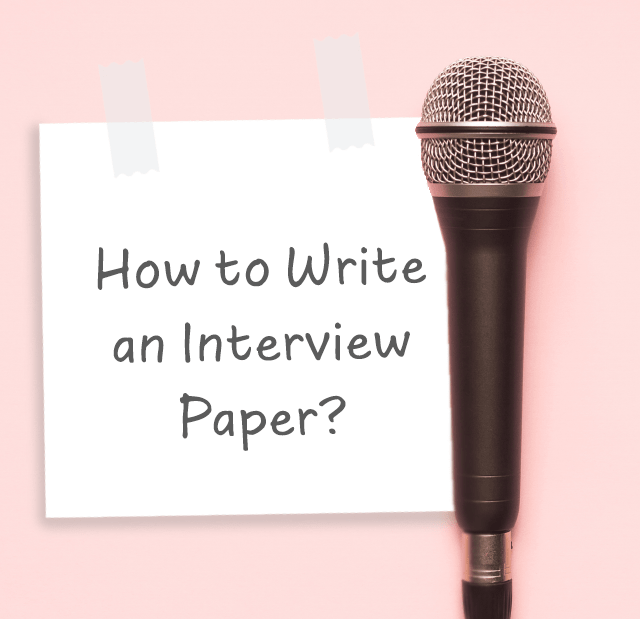

What is an Interview Paper?
An interview paper provides an expert opinion on a specific issue. In essence, it is an interview transcript inserted somewhere between the introduction and conclusion of an academic piece.
How long should it be? It depends on the topic and the length of your interview, but most papers are within the length of 2,000 – 5,000 words. What things should you consider before writing an interview paper in the first place? Let’s check them out below.
General Aspects of Writing an Interview Paper
Academic papers require you to provide arguments based on studies, research pieces, statistics, etc. But an interview paper is different – for this type of essay, you will develop assumptions around an expert’s opinion.
Let’s imagine your essay question reads the following: “Should we ban abortions?” If you write an interview paper, you should ask someone high-powered for their consideration. Let them be an executive director of the American Gynecological & Obstetrical Society.
You would reach them via email or phone or whatever communication channel you prefer and conduct an interview. Afterward, you would put all your findings on paper.
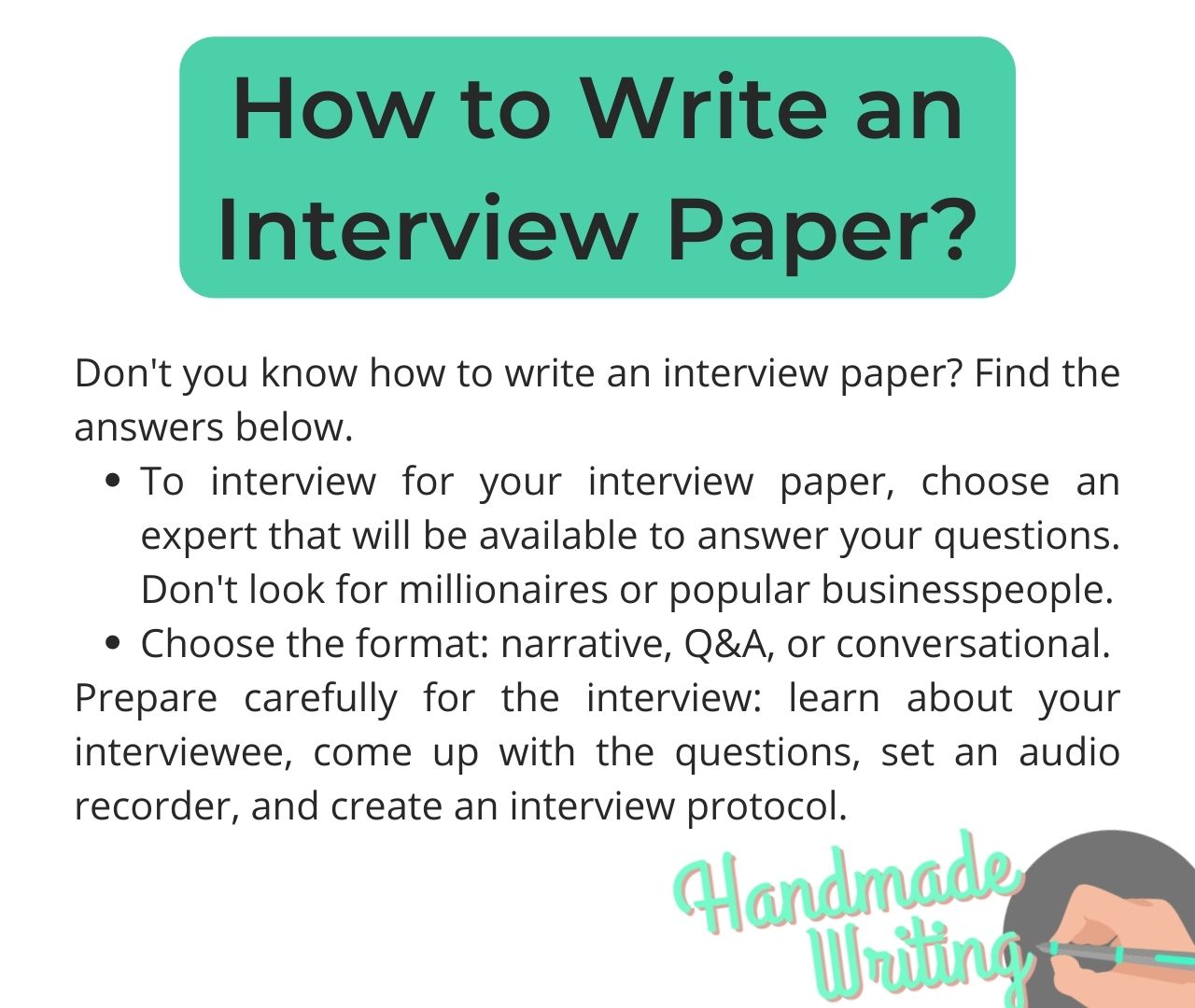
But in practice, writing an interview paper involves many more complexities and challenges, like planning, topic research , drafting, etc.
Let’s speak straight facts: nobody will reschedule their week to meet you because you need to do some homework. You’re one of the millions of students, and the local governor or a famous scientist won’t give you an interview nine times out of ten.
So you would want to target someone less busy, like professors from other faculties of your college or some researchers within your academic environment. Hunting a bigger fish is pointless unless you’re a well-established journalist working for a popular media channel. If you struggle to find someone within your college/university, you can contact people from your circle.
Writing Outline and Structure of an Interview Paper
As you know, a typical paper consists of three parts:
- Introduction. This part includes background information, the hook, the thesis statement, and the transition.
- Body. It is the longest part of the paper consisting of several paragraphs. It should contain the actual interview.
- Conclusion. The final part summarizes the considerations and insights of your essay.
The question is: ‘where should you put an interview transcript and how do you do this?’
To answer this question, you need to come up with the interview papers format in the first place. There are several of them:
The narrative format implies that you can use either direct or indirect speech when referring to your interviewee. If you choose this path, you can stick to a 5-paragraph essay structure, retell the considerations of your interviewee, and cite their words here and there at your discretion.
You can also choose this format if you contact several people. Check what a narrative interview paper structure looks like when you reach out to several people:
- Introduction.
- Paragraph #1 – the first interviewee’s perspective.
- Paragraph #2 – the second interviewee’s opinion.
- Paragraph #3 – the third interviewee’s thoughts.
- Conclusion.
Alternatively, you can dedicate each paragraph to a particular idea of one person.
“Question and answer” will suit your needs perfectly if you interview one person. It is the simplest format used in online magazines, news reports, and other media. Your interview paper outline will look like this:
- Introduction
- Question #1 – Answer #1
- Question #2 – Answer #2
- Question #3 – Answer #3
- Question #4/5/6/etc. – Answer #4/5/6/etc.
- Interview analysis. You may include your thoughts on the subject matter.
Conversational
Conversational style is informal, and you can use either first-person or second-person narrative and follow a typical 5-paragraph paper structure. But writing interview papers in this lousy style might be perplexing, especially if you deal with this task for the first time.
We advise you to try the Q&A format because it’s the simplest one and takes the least time. Just imagine how much time your paper writing will take if you decide to interview three or five people.
How to Start an Interview Paper?
If you have no idea how to start an interview paper, choose the topic first. Selecting a topic for your interview paper is not a big deal, but you should keep in mind that you may not find appropriate interviewees for it.
Let’s imagine you want to explore whether the government should force people to get vaccines. This topic implies that you need to contact authorities. It might be a local lawyer, governor, or executive director of a local hospital. Well, the chances are these people will politely refuse to give an interview for your homework.
But if you choose to investigate how lockdown impacts intellectual workers, you can contact your friends or family members who work at home. In other words, it’s better to choose topics that reflect the experiences of ordinary people rather than the opinions of untouchable experts.
Asking people for their opinion about well-known facts like the Earth’s shape is a bad idea. You would want to choose high-profile debatable topics you can actually discuss.
Establish the Goal of Your Interview Essay
You have to establish the goal of your essay before researching the topic. For this, ask yourself: “What message should your interview essay deliver?” Sometimes, a topic of your choice might already explain the purpose of your essay.
Conduct Research
Interviewing someone implies that you should ask questions. But you will fail to do so if you know little to nothing about your topic. So read some case studies, news, articles, etc. Once you get the picture of your subject matter, you will come up with dozens of interview questions.
Get to Know Your Interviewee
A good interviewer always refers to the life and experience of their interviewee. If you’re lucky to work with someone you can read about on the Internet, find out as much information about them as possible. If your interviewee publishes any books, articles, or studies, you will better know them as well.
The more you know about the person, the more interview questions you can come up with. You can ask them whether the Internet tells their true story: “Is it true that you, Mr. Interviewee, support flat earthers?”
Draft Your Interview Questions
If you want a person to share their in-depth vision of the topic, you need to ask both open-ended and close-ended (“yes/no”) questions. However, you may struggle to prepare interview questions. Many students get stuck during this stage. To overcome this block, you need to learn some types of interview questions:
- Opinion – What do you think of this topic?
- Behavioral – What would you do in this situation?
- Experience and knowledge – What do you know about the subject?
- Background – How are you connected to the subject? What is your age, occupation, etc?
- Emotional – How do you feel about the subject?
- Sensory – What does the subject taste and feel like?
You can also think of the questions following the interviewee’s “yes” and “no” answers.
Tips for Conducting a Successful Interview
These four tips will help you conduct a productive interview on the first try:
1. Plan Your Meeting
Note that you want to interview a person in a quiet place so that nobody will distract you. This might be some cozy book store or a café. Or, you can arrange an online meeting. Make sure you have at least one hour for the interview.
2. Rehearse a bit
If you will conduct your first-ever interview, you want to practice with your friends/significant other/ family in the first place. This approach will help you identify what stage of your upcoming interview may challenge you the most.
3. Record Your Interview
You will forget about 50% of the information within an hour once you finish the interview. So don’t rely on your memory − bring a recorder instead. Why not take notes? You wouldn’t want to go red while asking your interviewee to repeat what they have just said or wait until you write down their answers.
4. Talk to Your Interviewee for a While Before You Begin
Speaking to someone you don’t know might be uncomfortable. You don’t have to attack them with your interview questions straightaway. Instead, you can exchange some casual phrases or discuss the weather. This will help you relieve stress and get comfortable with each other.
5. Explain Your Interview Protocol
It’s better to explain to your interviewee how you will conduct your interview. Tell them that you will use a recorder and introduce the discussion topic.
Interview Papers Format

In academic writing, you have to explain the purpose of your interview and introduce your interviewee in a specific “scholarly” format. The APA format interview paper has the following requirements:
- Use 12-point Times New Roman.
- Write a title page.
- Use double spacing.
- Introduce your interviewee and provide the background information – explain why this person is suitable for the interview. Mention their name and qualifications.
- Use direct quotes if you cite some facts provided by the interviewee.
- Use block quotes for citations longer than 40 words.
How to Write a Title Page?
The title of your paper must include your name, your institution, department, the course name and number, the teacher’s name, and the assignment date. The rules of writing the title page are the following:
- The title page must be numbered.
- Capitalize all major words in your title and make it bold.
- Place the title of the essay three or four lines down the top of the page.
- There must be one empty line before the student’s name.
Interview Papers Examples
If you’re searching for an interview essay example – check several samples below:
- A narrative interview essay .
- A Q&A interview format paper.
- An interview with a scientist.
Interview Papers Writing Tips
The following writing tips will help you deliver the first-class interview paper:
- Write the introduction at the end. Once you finish your essay, you will likely reconsider some ideas you had before you began. They will help you frame your interview essay with a captivating introduction and conclusion.
- Give yourself a break after finishing your final draft. This will help you look at your paper with a fresh pair of eyes once you start editing.
- Edit one type of error at a time. For example, you can reduce logical errors first and switch to grammatical mistakes afterward.
- Use an active voice. If active voice makes your sentence shorter, use it without hesitation.
- Check for any sample interview paper to decide on the interview questions. Perhaps, some pieces will spark your interest.
Writing Help by Handmadewriting
An interview paper doesn’t seem that intimidating once you learn how to write it step by step. First, you have to choose the subject that allows you to interview ordinary people rather than hard-to-reach ones. Then, you need to research your topic, conduct an interview, and write a paper.
You can get an A+ for this assignment with enough effort and dedication. But a doable task doesn’t necessarily mean that you must do it by yourself. If you have plenty of other assignments to do, you can ask our essay writers to craft an exemplary interview paper for you. For this, you can place an order on our website, and we will do all the dirty work.

A life lesson in Romeo and Juliet taught by death
Due to human nature, we draw conclusions only when life gives us a lesson since the experience of others is not so effective and powerful. Therefore, when analyzing and sorting out common problems we face, we may trace a parallel with well-known book characters or real historical figures. Moreover, we often compare our situations with […]

Ethical Research Paper Topics
Writing a research paper on ethics is not an easy task, especially if you do not possess excellent writing skills and do not like to contemplate controversial questions. But an ethics course is obligatory in all higher education institutions, and students have to look for a way out and be creative. When you find an […]

Art Research Paper Topics
Students obtaining degrees in fine art and art & design programs most commonly need to write a paper on art topics. However, this subject is becoming more popular in educational institutions for expanding students’ horizons. Thus, both groups of receivers of education: those who are into arts and those who only get acquainted with art […]
- PRO Courses Guides New Tech Help Pro Expert Videos About wikiHow Pro Upgrade Sign In
- EDIT Edit this Article
- EXPLORE Tech Help Pro About Us Random Article Quizzes Request a New Article Community Dashboard This Or That Game Popular Categories Arts and Entertainment Artwork Books Movies Computers and Electronics Computers Phone Skills Technology Hacks Health Men's Health Mental Health Women's Health Relationships Dating Love Relationship Issues Hobbies and Crafts Crafts Drawing Games Education & Communication Communication Skills Personal Development Studying Personal Care and Style Fashion Hair Care Personal Hygiene Youth Personal Care School Stuff Dating All Categories Arts and Entertainment Finance and Business Home and Garden Relationship Quizzes Cars & Other Vehicles Food and Entertaining Personal Care and Style Sports and Fitness Computers and Electronics Health Pets and Animals Travel Education & Communication Hobbies and Crafts Philosophy and Religion Work World Family Life Holidays and Traditions Relationships Youth
- Browse Articles
- Learn Something New
- Quizzes Hot
- This Or That Game New
- Train Your Brain
- Explore More
- Support wikiHow
- About wikiHow
- Log in / Sign up
- Education and Communications
- College University and Postgraduate
- Academic Writing
How to Write an Interview Essay
Last Updated: March 11, 2024 Fact Checked
This article was co-authored by Diane Stubbs . Diane Stubbs is a Secondary English Teacher with over 22 years of experience teaching all high school grade levels and AP courses. She specializes in secondary education, classroom management, and educational technology. Diane earned a Bachelor of Arts in English from the University of Delaware and a Master of Education from Wesley College. This article has been fact-checked, ensuring the accuracy of any cited facts and confirming the authority of its sources. This article has been viewed 459,900 times.
An interview essay is designed to give the reader a general impression of the interview subject and to present their thoughts on a select group of topics. It also offers the opportunity to develop deeper insights by analyzing the interviewee's responses within a larger context. Interview essays are a common school assignment, and provide useful skills for those interested in journalism, or just being good writers in general. There are several formats that fit into the category, but a good interview essay of whatever type can make the reader feel as though they were asking the questions.
Interviewing for an Essay

- If your essay is to be a factual piece, you'll want to interview someone who has expertise in the subject matter you'll be addressing. If your paper is about a science topic, you'll want to interview a scientist in that field. If your paper is about a period of history, you'll want to interview either a historian or someone who's lived through that period of history.
- If you plan to make your essay an opinion piece, you'll likely want to interview someone who has a strong opinion about the topic covered in your essay. Ideally, you want someone who can express opinions articulately, and who also has credentials in the area you plan to write about.
- If your piece will have a narrow perspective, you'll need to interview only one or two people. If your piece will present a general consensus, you'll need to interview more people, probably with varying expertise and credentials.

- When available, read works about and works written by your subject, both in print and online. At the same time, research the topic associated with your subject. The more you know about both, the more intelligent questions you can ask.
- Look for previous interviews your subject has given, as well. These will give you an idea of what questions the person has been asked before, so you can decide on appropriate subjects for your own questions, including questions that no one else has asked.
- Questions that require "yes" or "no" answers are good for gathering specific factual information; open-ended "how," "why," and "tell me about" questions are great for gathering additional background material not found in your research.
- Draw up a list of the questions you are prepared to ask. Have more questions ready than you will likely use, so that you can make adjustments as the interview takes place. (For instance, your subject may begin focusing on what you thought was a side topic, but turns out to be the key part of your interview.) Rank your questions in order of importance to make sure you ask your best ones, or list them all in the order you'd ask them and color-code the most important ones.

- Choose a quiet place with few distractions for your interview site. A library, restaurant, or campus location if you're doing this for a college writing class would be suitable.
- You may want to get the interviewee's consent to use their comments in your essay in writing, as well as permission to record those comments during the interview. By law, if you are recording an interview conducted over the phone, you must obtain written permission. [4] X Trustworthy Source University of North Carolina Writing Center UNC's on-campus and online instructional service that provides assistance to students, faculty, and others during the writing process Go to source
- It's helpful to have a backup interviewee in case the person you plan to interview can't make it.
- Be on time at the place you've agreed to meet for the interview.

- Using a recording device (with permission) is almost always advisable, as it permits you to save your note-taking for jotting down your insights on contexts, themes, how your subject approaches the questions, his/her comfort level, and so on.
- Be patient and respectful as you ask your questions and wait for responses. Give the interviewee time to reflect, and you will likely be rewarded with more insightful answers. A few deeper responses are usually better than many superficial ones.
- Immediately after the interview, write down your thoughts and impressions about the interview and interviewee. They may help you shape the essay.
- Always end the interview by thanking the person.
Writing the Essay

- Narrative format. This form allows paraphrasing of some information the interviewee says, along with direct quotes for the material you most want to emphasize. This is the most likely format for a class assignment, and offers the most opportunity to add context and analysis.
- Conversational format. This is a looser format than the formal writing style required for most essays. You can address the reader directly and use both first and second person. This format can be suitable for anything from class assignments to magazine articles.
- Question-and-answer format. This form presents your questions to the interviewee, followed by the interviewee's responses. (That is, the text looks something like this: (Your Name): How long have you been in the circus? (Interviewee's Name): About 35 years.) These are always direct quotes, although you may insert explanatory material in parentheses and substitutions, such as a person's name in place of a personal pronoun, in brackets. This format is best suited for essays with only a single interviewee or a closely related group, such as spouses or the core cast of a TV show.
- Informative format. This format usually interweaves the interview with research you've done on the subject, incorporating some of that research in the text to provide background and give it a little more color.

- Read over your interview notes and listen to any audio / video recordings you have. Utilizing both whenever available will allow you to thoroughly consider both the highlights of the interview and the most significant themes to emerge from it. These, in turn, will inform your outline of what information your essay will cover and how it will appear. [9] X Research source
- One possible outline could be an introduction that starts with an anecdote about the interviewee and then presents your thesis statement, several key points that support the main focus, and a conclusion that summarizes the information presented. Traditional school essays often utilize a five paragraph format (introduction, three supporting paragraphs, conclusion), and this can often work with interview essays as well.

- If, however, the purpose of your essay is to use your interviewee's comments to support a position or examine a larger theme, your thesis will probably be a statement of that position or theme, with the interview / interviewee placed within that context. For instance: "John Doe's mixed feelings of pride and betrayal reflect those shared by many Vietnam veterans still with us."
- Regardless of essay format, make your thesis clear and concise, and be sure that the remainder of your essay refers back to it. See How to Write a Thesis Statement for more advice.

- Interviews can sometimes produce a good deal of repetitive answers (even with high-quality questions), so you may need to trim repetitions and unnecessary elements from the body of your essay. Make sure that whatever material you do keep remains true to both the spirit of the interview and the overarching focus of your essay. [10] X Research source
- A handout from the Writing Center at the University of North Carolina (available at http://writingcenter.unc.edu/handouts/oral-history/ ) provides a wealth of valuable materials on interview essays. It includes, for instance, examples of how to utilize the same interview materials in a transcription (question-and-answer format), a presentation of individual experiences (quotations and paraphrases), and the placing of the interview / interviewee in a larger context (paraphrasing and quotations with ample explanation).

- Reading over the essay yourself is a good start, but it is always wise to have another set of eyes look it over as well. Another reader is likely to catch errors, repetitions, and unclear sections that you have glossed over. [12] X Research source
- Go back to your original interview notes, recordings, and transcripts, and make sure that your essay continues to reflect the actual interview. Layers of editing and revising can sometimes cause the essay to drift away from the original source and intent. You may even want to let the interviewee read it over to ensure that it captures their voice. [13] X Research source

- Any materials you used for research, information about the interviewee, or context for the essay itself should be referenced in the approved citation format for your essay.
- Make sure one more time that any direct quotations from your source are placed in quotation marks, and any paraphrasing is done without quotation marks. Don't put words in your subject's mouth, and respect the words that do emerge from it.
What Are The Dos And Don’ts Of a Journalistic Interview?
Expert Q&A

- After the interview, send the interviewee a written thank-you note expressing your appreciation for their time. Thanks Helpful 0 Not Helpful 0
- If the person you're interviewing is busy or elderly, you may want to plan for more than one interview session. Observe the interviewee for signs of impatience or fatigue. Conduct multiple, shorter sessions if necessary. Thanks Helpful 0 Not Helpful 0

- If you plan to interview someone over the telephone, permission to record the conversation is required by law. Thanks Helpful 15 Not Helpful 3
You Might Also Like

- ↑ http://writingcenter.unc.edu/handouts/oral-history/
- ↑ https://www.indeed.com/career-advice/interviewing/interview-paper
- ↑ http://www.whatkidscando.org/featurestories/2007/maine_students/tip_sheets/FIRST-PERSON%20ESSAYS%20TIP%20SHEET.pdf
- ↑ http://www.brighthubeducation.com/help-with-writing/97515-how-to-write-an-interview-essay/
- ↑ https://owl.purdue.edu/owl/general_writing/the_writing_process/proofreading/proofreading_suggestions.html
About This Article

To write an essay from an interview, you’ll first have to decide on the format the essay will take, as this will determine the structure and what you write. The most common form is the narrative format, in which you use direct quotes and paraphrase your subject to add context and detail, or you can write in a more conversational tone, or even in a directly transcribed question-and-answer form. Once you decide on format, plan an outline by forming a central thesis, which will be the central statement your essay is making. Add onto the outline by drafting supporting evidence directly from the interview and from other sources, like books, newspaper articles, other essays, anything else to support your point. Write and finish the essay by combining information from the interview and other sources with your own explanations and words. To learn about how to conduct the interview to get enough information to write about and how to finish the writing process, keep reading! Did this summary help you? Yes No
- Send fan mail to authors
Reader Success Stories
Oct 19, 2016
Did this article help you?
Tyler Jordan
Sep 11, 2016
Tawana Moos
Nov 20, 2017
Mar 28, 2016
David Mcaniel
May 23, 2017

Featured Articles

Trending Articles

Watch Articles

- Terms of Use
- Privacy Policy
- Do Not Sell or Share My Info
- Not Selling Info
Get all the best how-tos!
Sign up for wikiHow's weekly email newsletter
How to Write an Interview Essay: Complete Guide
College and high school teachers often assign interview papers to test their learners’ planning, paraphrasing, and critical thinking skills. So, besides drafting a well-substantiated and information-packed piece, students must also organize and conduct an interviewing process.
Hence, this assignment is far from straightforward. Quite the contrary, it requires substantial pre-work before the actual meeting. Moreover, the task further complicates if you include several subjects or elaborate on a compelling theme.
What if you can’t meet an ideal candidate to elaborate on your topic? How to pose questions that reveal valuable information and present your findings on paper? How to write an interview essay introduction with attention-grabbing ideas that bring up current dilemmas or resolve an issue? There are so many trilemmas spinning around your head.
Fortunately, there’s no need to feel intimated or discouraged. This article will help you grasp the basics of an interview paper and how to write an outstanding piece. It will also discuss the steps involved in the writing process and give a few helpful tips that ensure your final product passes with flying colors.
What Is an Interview Essay?
An interview paper is an academic written piece that presents the insight the interviewer gained while interviewing one or several people. It aims to expose different perspectives on a particular topic once the writer gathers relevant data through research. Typically, the essence of the paper will rest upon your findings from the interviews.
The presented viewpoints will depend on the respondent. So, for example, if your paper interview focuses on social media, you might consider talking to an influencer. Conversely, if you’re elaborating on a burning social issue, you may want to speak to a local authority. Or set up a meeting with a scientist if you’re exploring natural sciences.
The interview paper must help the reader understand a concept backed by relevant statements. Unlike definition essay writing , where you paraphrase and cite trusted sources like scholarly books, the interview paper will stem from authoritative individuals in the respective field.
Finally, you can reap a lot of benefits from drafting interview essays. More specifically, those interested in becoming broadcast journalists, newspaper reporters, or editors will learn to pose thought-provoking questions. Similarly, HR managers will polish their screening ability and hire excellent candidates. Even prospective detectives and inspectors can gain from writing an interview essay. They will formulate a variety of engaging questions to get honest and accurate answers.
Outline and Typical Structure of an Interview Paper
Most essays follow the template of a basic 5-paragraph paper. Yet, the length can vary according to your subject and data availability. A standard interview essay from a custom writing service can range from 2,000 to 5,000 words or up to ten pages. Individual works are usually shorter.
The interview essay format will have an introduction, body segments (perspectives grouped under different subheadings), and a summary. Here’s an overview of what to put in each part.
Introduction . The writer needs to create an atmosphere of uncertainty and urgency to stimulate the audience to keep reading. It should also provide background information about the theme and the interviewee. Furthermore, the initial part can list statistics or what society thinks about the respective topic. Finally, your intro must contain a thesis that transitions into the main section.
Body . This part will present the pillars on which you conceptualized your research. If you get stuck while drafting the body, you might hire an online service to write an essay for you and incorporate the gathered data. They will isolate the main points and help you frame the perfect timeline of events.
Moreover, the body should reflect important facts, life periods, and considerations of your interviewees. For instance, you might split your paper into infancy, adolescence, university, marriage, and golden years. Or you might divide your segments according to different discussion questions.
Conclusion . Use the ending part to summarize the interviewee’s thoughts and your insights into the matter. You might also compare the available data to the facts collected during the meeting and verify their validity. The bottom line must leave a lasting impression on your audience.
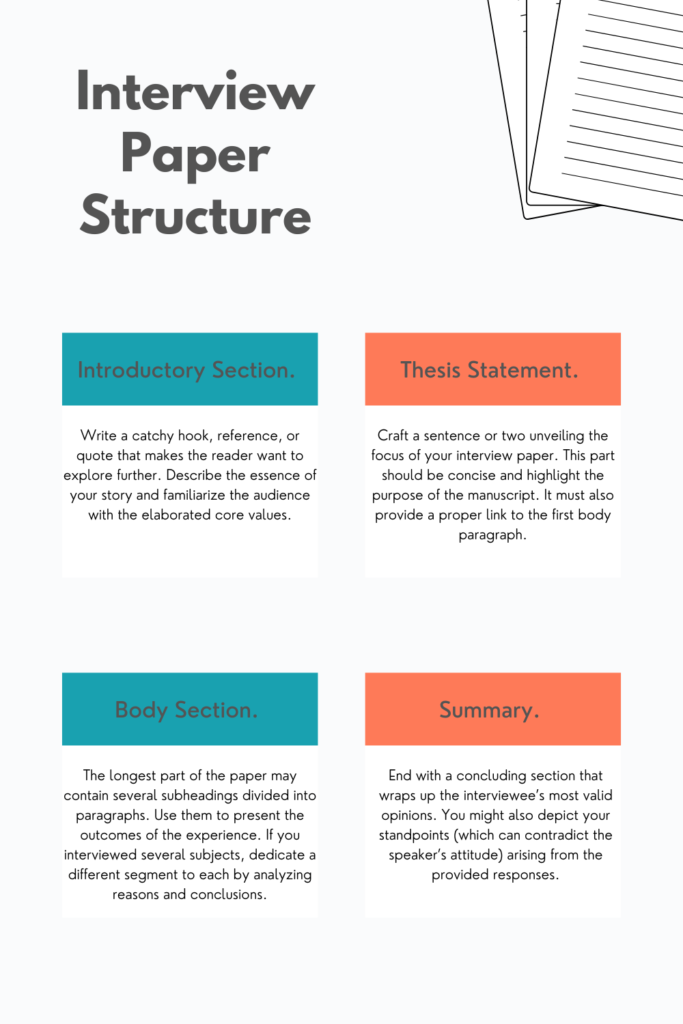
Steps for Writing a Successful Interview
Below is a detailed description of the paper composition journey. Consider each step carefully and be consistent in your approach.
Define the Paper’s Objective
Writing an interview paper urges you to establish the overall purpose. You will have to specify the message you plan to deliver. For example, if you want to verify a public opinion, you’ll have to question several subjects. Alternatively, proving a natural phenomenon will require a conversation with an expert in the field.
Explore the Subject
Find and prepare printed and virtual materials related to your research. Previous interviews and works by the interviewee are also vital. Unlike rebuttal essays , your primary goal is to gather details supporting your claims. Therefore, brainstorm any note you found based on your predefined criteria.
Pick an Interview Format
Your sample form will depend on the specific theme. Most students decide to buy a literature essay online due to their lack of formatting skills. Here are the various formats you can choose when presenting your findings.
This format implies using direct or indirect speech to analyze the storyline. Consider retelling the considerations of the interviewee and citing the original wording. The narrative format is also advisable if you talk to a few interviewees. The structure should contain an intro, a body (each paragraph can describe a particular idea of a single person), and a summary.
Question-and-answer essays are ideal when interviewing one person. Most magazines and news reports prefer this type because it is the simplest. Your interview paper will have an intro, different parts for each question and answer, an analysis with your perspective, and a summary.
Informative
Also known as conversational or personal, these papers are informal and take first or second-person narration flow. However, writing in a dialogue form might be confusing and perplexing for an untrained eye.
Formulate the Questions
Make a thorough list of all the aspects you want to discuss and cover in the interview paper. Ask close-ended (yes/no) and open-ended questions that require in-depth responses. If you struggle with your questionnaire, consider the following suggestions:
- Share your core values
- What would you change in the world if you had a superpower for a day?
- How did your childhood impact your personality?
- What is the recipe for success?
- What is the best aspect of your job?
- How do you overcome your deepest fears?
- Define happiness with examples
- What object do you hold most dear and why?
- What is the most significant challenge in our society?
- How do you imagine the world’s future?
Get in Touch with the Respondent
Make an effort to contact your interviewee/s and be professional when arranging the meeting. You might need to use several communication channels to reach your target person. Focus on scheduling a time that works for everyone involved in the project.
Facilitate the Interview
Choose a peaceful and quiet place without any distractions. Always arrive on time for the meeting. Alternatively, consider setting it up in an online format, if finding a physical location isn’t viable. Most importantly, allow the speakers enough time to share their thoughts and maintain an impartial attitude to avoid miscommunication.
Interview Essay Writing Tips
Here’s some additional advice for writers taking the first steps toward interview writing.
Stick to Your Teacher’s Instructions
Your professor will probably mention the paper structure. For instance, if you receive a classification essay writing guidelines , don’t experiment with other formats. Moreover, rehearse the face-to-face meeting with a family member to avoid possible deadens. Here, you might come up with a follow-up question that clarifies some vague points.
Quote and Paraphrase Your Sources
Organize all the details on the background, education, and achievements before interviewing itself. When referring to the topics discussed, cite them properly and give credit. Also, explain the protocol to the respondent and the purpose of the research.
Consider Recording the Interview
The longer the meeting, the more details you’ll forget once you finish it. Avoid over-relying on your memory, and bring a recorder. Taking notes is also essential. However, don’t record unless the respondent gives prior approval.
Mind These Formatting Rules
Use a font size of 12 in Times New Roman with double spacing. Don’t forget to write a title page, too. When including citations longer than 40 words, use block quotes.
Edit and Proofread
Don’t expect the first draft to be the best. Reduce grammar mistakes and typos by polishing your initial wording. The final version must be logical, easy to read, and plagiarism-free.
Bottom Line
As intimidating as the interview paper might seem at the onset, these guidelines will help you stay focused and organized. Above all, pick an important topic with questions that affect ordinary people. This way, you can set up and develop the interviews more quickly. Undoubtedly, an A+ grade takes dedication and perseverance to research and write your paper.
Related posts:
- How To Write A Good Compare And Contrast Essay: Topics, Examples And Step-by-step Guide
How to Write a Scholarship Essay
- How to Write the Methods Section for a Research Paper: Effective Writing Guide
- Explaining Appeal to Ignorance Fallacy with Demonstrative Examples
Improve your writing with our guides

Definition Essay: The Complete Guide with Essay Topics and Examples

Critical Essay: The Complete Guide. Essay Topics, Examples and Outlines
Get 15% off your first order with edusson.
Connect with a professional writer within minutes by placing your first order. No matter the subject, difficulty, academic level or document type, our writers have the skills to complete it.
100% privacy. No spam ever.

How to Write an Interview Essay: Questions, Topics, Examples & Tips

In the realm of writing, interviews bring a unique touch, a personal narrative that adds depth to your words. Picture this: someone's story unfolding through your pen, their experiences laid out for the world to read. But how do you capture that essence, ask the questions that matter, and turn it into a compelling read?
Fear not! Our guide breaks the interview essay examples down for you, step by step, making essay writing for interview as simple as sharing a cup of coffee with a friend. So, let's get started on turning conversations into captivating tales that will help you get your first remote job !
What Is an Interview Essay?
The process of interview essay writing is essentially a conversation transformed into written form. It involves engaging with someone, posing thoughtful questions, and then translating their responses into a narrative for others to read. Think of it as capturing the essence of a personal exchange, where the interviewee shares their experiences, insights, or expertise.
The goal is to convey the individual's unique perspective and story in a way that resonates with readers. It's like being a storyteller with a purpose – to amplify someone else's voice and share their narrative with a broader audience. Interview essays provide a platform for individuals to express their thoughts, share their journeys, and contribute their perspectives to a wider conversation.
How to Write an Interview Essay?

Step 1: Define the Essay's Purpose
Start your journey into crafting a job interview essay by figuring out exactly what you want to achieve. Ask yourself: Why am I conducting this interview, and what story or message do I want to share? It could be about someone's experiences in the professional world, valuable insights into a particular industry, or shedding light on the intricacies of a specific job role. Having a clear purpose will help you stay on track and make sure your essay has a point.
Step 2: Explore the Subject through Research
Before you dive into the interview, take some time to get to know the person you'll be talking to. Look into their background, experiences, and anything else that might be important. This research not only helps you come up with good questions but also shows the person you're interviewing that you care about their story. Knowing more about your subject makes your questions more thoughtful, turning the phone interview into a richer and more interesting conversation.
Interview Essay Topics
Need a dose of inspiration? Our experts have compiled compelling essay topics for interview. Explore and choose one that sparks your curiosity and invites in-depth analysis:
- How do people feel about remote work after experiencing it?
- What's the most memorable volunteer experience for community members?
- How do small business owners handle daily challenges?
- What makes a family game night special for different families?
- How do individuals manage stress in their everyday lives?
- What are the favorite childhood memories of people in your community?
- How do pet owners bond with their furry friends?
- What are some creative ways people stay active without going to the gym?
- How do grandparents share wisdom with younger generations?
- What role do hobbies play in people's lives for relaxation?
- How do individuals practice self-care on a busy schedule?
- What's the favorite local food joint for residents in your area?
- How do students manage their time during exam periods?
- What's the secret behind successful long-term relationships?
- How do individuals find joy in simple, everyday moments?
- How do people discover and choose their favorite books to read?
- What's the go-to comfort food for individuals on a rainy day?
- How do commuters make the most of their time during daily travels?
- What's the most cherished holiday tradition for families in your community?
- How do individuals celebrate personal achievements and milestones?
Step 3: Formulate Your Questions
Now that you've got a grip on your essay's purpose and know your subject, it's time to craft thoughtful questions. Think about what will bring out the most interesting and meaningful responses. Ask open-ended questions that encourage the interviewee to share their experiences, insights, or opinions. This step is like laying the groundwork for a conversation that will unveil the essence of your subject's story.
Interview Essay Questions
- How has the integration of technology impacted your communication within your family?
- Can you share a transformative experience from participating in a unique sports or recreational activity?
- What strategies have you employed to foster a positive work-life balance in your professional journey?
- In your opinion, what elements contribute to creating a successful and harmonious blended family dynamic?
- How do you navigate and manage personal finances to ensure financial stability and security?
- Can you recall a specific instance where a mentor or role model profoundly influenced your life choices?
- What innovative methods have you discovered for staying connected with distant relatives or friends?
- How do you incorporate mindfulness and mental wellness practices into your daily routine?
- In your experience, how do cultural traditions shape and influence family dynamics and relationships?
- Can you share a travel experience that left a lasting impact, broadening your perspective on life?
- What are your strategies for maintaining a healthy and active lifestyle despite a busy schedule?
- How do you approach and overcome creative blocks or challenges in your artistic endeavors?
- Can you recount a significant moment of personal growth or self-discovery that shaped your identity?
- What lessons have you learned from navigating a cross-cultural or interfaith relationship?
- How do you approach building a sense of community and fostering connections within your neighborhood?
- How do you incorporate eco-friendly practices and sustainability into your daily life?
- How much of an impact does social media have on personal relationships and societal dynamics?
- Did you ever face a major decision and the thought process that guided your choice?
- How do you stay informed about current events, and how does this impact your worldview?
- How much are you involved in a hobby or passion that brings you joy and fulfillment?
Step 4: Reach Out to the Interviewee and Ready Yourself for the Interview
Take the plunge and connect with the person you're interviewing. Reach out in a friendly manner, explaining your purpose and why you value their perspective. Once you've secured the interview, prepare yourself. Familiarize yourself with the questions, make sure your equipment (if any) is ready, and create a comfortable setting for the conversation. Being organized and ready ensures a smooth and effective interview process, allowing the person you're speaking with to open up and share their story effortlessly.
Step 5: Conduct the Interview
Now that you've set the stage, it's time for the main event! As you step into the interview, approach it with a genuine sense of curiosity, as if you're unwrapping a present of stories and insights. Take a moment to breathe and let the conversation unfold naturally. Pose your questions with patience, allowing the interviewee the space to share their thoughts.
Active listening is key – not just to their words but to the nuances in their tone and the emotions beneath the surface. It's in these unscripted moments that the most captivating and unexpected stories often emerge. Embrace flexibility, as sometimes the richest narratives come when you least anticipate them. Remember, your ultimate aim for successful interview essays is to authentically capture the essence of the person's experiences or insights, so let the first job interview be a genuine and unfiltered exploration.
Step 6: Select an Interview Essay Format
As you wrap up the interview, consider how you want to present its essence. The right format sets the tone and it is your tool to engage the readers effectively in your interview essays.
You have a variety of styles to choose from: opt for the classic Q&A, where questions and answers flow seamlessly; weave a narrative, transforming responses into a compelling story; or adopt a thematic structure for a logical organization. Each style brings its own flavor to the table. The format you choose becomes the lens through which your readers experience the interview, so select one that not only enhances the narrative but also resonates with your audience. Ultimately, your choice of format shapes how your audience engages with the richness of the conversation.
Step 7: Develop an Interview Essay Outline
Now that you've gathered all the insightful details, it's time to structure your essay. Create an interview essay outline that organizes the key points, highlights significant moments, and establishes a logical flow. Consider the introduction, body, and conclusion, and map out how the interviewee's story will unfold. This roadmap will guide you on how to write an interview essay, ensuring a cohesive and engaging narrative that does justice to the richness of the conversation.
Introduction:
The introduction to an interview essay is where you say hello to your reader and give them a sneak peek into what's coming. Briefly introduce who you interviewed and share a little about why their story is worth hearing. You can start with something interesting to grab attention, like a question or a surprising fact. The main job here is to make your reader curious about what comes next.
The body is where the real action happens. Think of it like the main part of a story. Each paragraph tackles a different aspect of what you learned in the interview. Start with the most important points and follow a logical order. Share the juicy details and interesting moments. Keep things organized, so your reader can easily follow along. It's all about presenting the interviewee's story in a way that's interesting and makes sense.
Conclusion:
The conclusion is your chance to wrap things up. Summarize the key points from the interview and remind your reader why it's important. You can add a personal reflection or suggest what readers might take away from the interviewee's experiences. End on a strong note, leaving a lasting impression. It's like saying goodbye but making sure it's memorable.
Step 8: Proofread Your Work
Before sharing your interview essay writing with the world, take a moment to proofread. Check for grammar and spelling errors, ensure the sentences flow smoothly, and verify that your chosen format enhances the overall readability. This step is your chance to polish the final product and present a well-crafted piece. A carefully proofread essay not only reflects professionalism but also ensures that your audience can fully focus on the captivating story you've worked so diligently to convey.
Step 9: Include Proper Citations
As the finishing touch to your interview essay, don't forget to give credit where it's due. Include proper citations to acknowledge any external sources or references used during your research. Whether it's direct quotes, paraphrased information, or data from other works, citing your sources adds credibility to your essay and shows respect for the original contributors. Follow the citation style specified by your assignment or publication guidelines, ensuring transparency and integrity in your writing. This step ensures that your readers can trace back and explore the sources that contributed to the depth of your interview essay.
Life Is about Balance — Don’t Do Things in Excess.
Hire an Expert to Balance Work and Studies!

Interview Essay Example
To illustrate the art of turning a conversation into a compelling essay, let's delve into an interview essay sample with Sarah Rodriguez, an avid urban gardener with a green thumb and a passion for sustainable living. Through this example, we'll explore how to capture the essence of someone's experiences and insights, transforming a casual chat into a narrative that resonates:
Sarah Rodriguez's balcony garden in the heart of the city is a testament to the possibilities of urban gardening. As we sat surrounded by thriving plants, she shared her journey into sustainable living and the joys of cultivating a green oasis in a concrete jungle.
Urban gardening might seem like a niche interest, but for Sarah, it's a way of life that has transformed not only her living space but also her perspective on sustainable practices. In this interview, we'll dive into the roots of Sarah's passion, exploring how she turned a small balcony into a flourishing garden and gained insights into sustainable living along the way.
Sarah's journey began with a desire for fresh herbs, a longing that led her to experiment with container gardening. 'It started small, with a few potted herbs like basil and mint,' she recalled. 'But as I learned more about sustainable gardening practices, it evolved into something much more significant.'
Each paragraph in the body delves into a different aspect of Sarah's experience. From the challenges of limited space to the joy of harvesting her own produce, the narrative weaves through her urban gardening adventure. Key moments, such as discovering the benefits of composting or experimenting with rainwater harvesting, add depth to the story.
As we wrap up the interview, Sarah reflects on the impact of urban gardening on her life. 'It's not just about the plants; it's about connecting with nature in the midst of a bustling city,' she shares. Through Sarah's journey, we glimpse the potential of turning a small balcony into a sustainable haven. This interview essay not only captures the practical aspects of urban gardening but also highlights the personal growth and connection to the environment that can stem from such a simple yet impactful endeavor.
Bringing It All Together
We hope you picked up some handy tips in this guide to shine in your journalism class. But hey, if you crave more guidance on how to prepare for a job interview essay, our expert writers are all ears and ready to share more insights! Feel free to reach out for extra help and nail that assignment with confidence.
Need a Professional Experienced Writer?
We exclusively work with the greatest authors, who offer students unique, customized writing. Ask for our assistance if you need to purchase essays online

Our Latest Blog Posts
.webp)
How To Write an Interview Essay
The aim of an interview is that through using people rather than books or articles, the writer can obtain a first-person viewpoint on a subject. The interview can be related to experiences in their life or may be related to a field in which they are an expert. Clearly these types of essays require a different form of planning and research. Typically, this includes the following steps:
- Determine the subject on which the person is to be interviewed.
- Identify the target interviewees, contact them, and ask for consent.
- Personal details (name, occupation, or credentials where appropriate, age if relevant, location if relevant)
- Primary question: The main focus of the work and some short main topic questions
- Notes on exploring the respondent’s answers – i.e., reminder questions for the writer such as “why do you feel that way?”, “Can you explain that in more detail?”, “Why do you think some people disagree with you?”
- Analyse the information / answers given by your interviewee.
Once you have followed these stages, you can draft / outline your interview essay in a more standard format:
- Break up the responses into key themes or points that you will make.
- Identify any other sources that you will use in your essay.
- Give an approximate word count to each section.
Note that using closed questions requiring “yes/no” answers are effective for gathering factual information, however, more detailed responses can be achieved with open-ended questions starting, “how”, “why”, “talk to me about…” and similar. Using these questions also encourages you to ask more for more detail that will expand your essay and source information.
Analysing your interviews
When analysing your interview(s), the approach will depend on the focus of your interview. For example, if you have undertaken 2/3 interviews for considering an experience, you may wish to follow the narrative route. However, if you have undertaken only one interview on a specific topic in which your interviewee is an expert, you may look at content analysis. In both cases, however you should, as you look through the interview notes or transcriptions if you have these and ask yourself:
- What reasons/ points/ perspectives did the interviewees give in support or opposition to the main topic
- Are they positive or negative?
- How does their responses compare to existing views?
- How interesting or important are the responses given?
- What is your own perspective of the views/reasons/responses given?
Once you have written down your initial analysis in order to structure your interview essay in a logical format you should then list the points/reasons given in the following way:
- least to most important
- positive first, then negative
- negative, then positive
- those you disagree with, those you agree with
- those which are pretty typical, those which are unusual.
Writing your Interview Essay
Introduction.
Your introduction should commence with an indication of the key question asked. This can either be in the form of a comment from the interviewee or a description of the situation that led to the development of your main question.
In addition, you should clearly state the type of interview undertaken (survey, narrative etc.) so that the reader has a context for your work. The introduction should then provide an overview of the responses given, along with your own perspectives and thoughts on these (your thesis statement) before introducing the body of the essay through linking. For example, “having stated X, the work will now provide a more detailed overview of some of the key comments and their implications in relation to XX”.
The body text should follow the order of your points indicated above. Use only one paragraph per point structured by indicating the point made, why you agree/disagree and any other relevant subpoints made by the interviewee in regard to the first points.
The paragraph should conclude with a link to the next theme which leads to the next paragraph and demonstrates cohesion of thought and logical flow of reporting the interview analysis. Note: you can include quotations from the interview, but do not rely on these, they should only be used to reinforce a point of view, and where possible avoid the inclusion of slang or swearing unless it is vital to the point you are making.
Your conclusion should bring together all the perspectives given by the interviewee. It is, in effect, a synopsis of the work with your own conclusions included. It is useful to refer back to the main question and your thesis statement to indicate how the interviewee answered (or not) your question and what this means for your future views or action in regard to the topic. A strong conclusion is as vital as a strong introduction and should not introduce any new information but should be a precis of the overall essay.
Key Phrases for an Interview Essay
The main subject under discussion was…”
“The interviewee was very clear when discussing…”
“The interviewee was somewhat vague when asked about…”
“This raised the question of…”
“When asked about x, the interviewee stated/asserted/claimed/maintained/declared, believed/thought/.”
“From the perspectives given by the interviewee it seems that…”
You may also like

How to Write an Interview Essay: A Guide
- Kellie Hayden
- Categories : Help with writing assignments paragraphs, essays, outlines & more
- Tags : Homework help & study guides

How to Write An Interview Essay
Interviews can be a great way to get first person information on the life and experiences of your subject. This article will walk you through the steps on how to write an interview essay. Before writing the essay, you have a lot of prep work to do. Decide what you would like to write about and determine an interesting figure you can interview. Do some preliminary research before the interview itself to decide what kind of questions you should ask. During the interview, make sure you take a lot of notes, or best of all, tape record the interview (with your subject’s permission) so you can remain focused on the conversation. If you need more help with the interview portion, read this article .
Organizing the Notes of the Interview
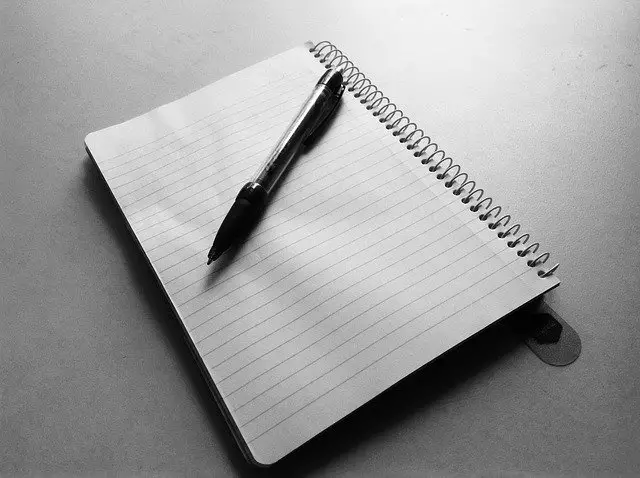
First, you need to know if your teacher wants you to write the essay in a narrative format or in a question answer format. This will affect how you organize your paper. Both essay formats need a strong introduction, an organized body and a solid conclusion. The difference is that the question and answer essay will use direct quotes with your questions. The narrative essay can have paraphrased information from the interview mixed in with direct quotes.
Writing the Informational Interview Essay
Hopefully, you took copious (many) notes during your interview and hopefully you were allowed to record the interview to catch any information that you missed in your notes. Now, you need to organize your information into a logical outline Probably the easiest way to organize all the information is to read through your notes and to listen to the recording of the interview. You need to think about what the reader would like to know about the person you interviewed. Pick three main themes or ideas that you talked about during the interview. These will become body paragraphs for your essay. Once you have wrapped your brain around the three main things you are going to talk about in your essay, you need to write out an outline.
Sample Outline
This outline will help you write a five paragraph essay for a narrative format. However, you can easily organize your question and answer format essay using this outline as well. I. Introduction Start with a humorous or interesting anecdote or fact that the person told you. Thesis statement: A thesis statement is one sentence that tells who was interviewed, his or her title, and why you interviewed the person. Basically, what do you plan to tell your reader about this person? This must be in the introduction, and you must spell the person’s name correctly. Read this article on how to write a thesis statement for more help. II. Body paragraph 1: One big idea you learned III. Body paragraph 2: Second big idea you learned IV. Body paragraph 3: Third big idea you learned V. Conclusion: You need to wrap up your essay by summarizing and writing some concluding remarks about the person.
Write the Interview Essay
Depending on the assigned length of your paper, you can write a paragraph for each Roman numeral on your outline. However, if you need to write a longer essay, you can have several paragraphs for Roman numerals II, III, and IV. You need to make sure that you put quotation marks around words that the person said, and you need to make sure that you body paragraphs support your thesis statement. Once you have a rough draft written, you need someone to peer-edit your paper. Then, you can write a final copy for your teacher. You should now be an expert on how to write an interview essay. You may need to edit and revise your essay to get a top grade, but you should understand the writing process for the interview essay.

This post is part of the series: Interviews and Essays
The following articles will help you to complete an interview and write the interview essay.
- How to Interview Someone for a Paper
- How to Write an Interview Essay
Have a language expert improve your writing
Run a free plagiarism check in 10 minutes, generate accurate citations for free.
- Knowledge Base
- Applying to graduate school
- Grad School Interview Questions & How to Answer Them
Grad School Interview Question & How to Answer Them
Published on March 29, 2021 by Lauren Thomas . Revised on June 1, 2023.
Grad school interviews are the last step of the application process , so congratulations for making it to this stage! Getting this far is a big accomplishment—graduate schools only conduct interviews with those applicants they are seriously considering accepting.
Grad schools conduct interviews to assess your “fit” with their program and faculty, as well as your interpersonal skills. In many cases, they may also be attempting to match you with a supervisor.
Before the interview, you should prepare by doing your research and reflecting on how you’ll answer these common questions.
Table of contents
How to prepare for your interview, questions about your background, questions about your interests and motivations, questions about your post-graduation plans, what to ask your interviewers, other interesting articles, frequently asked questions about grad school interviews.
First, read the website of the program you’re interviewing for. They’ll usually have information on job placement, curriculum, and expectations of graduate students.
If possible, talk to previous students about their experiences interviewing. Although no two interview experiences are exactly alike, they may be able to provide you with valuable tips for preparing.
You should prepare answers for certain, very common questions. You don’t need to memorize your answers—you don’t want to sound scripted, but you should have a sense of what you’ll say.
Don’t be afraid to take a few seconds to gather your thoughts before answering a question. Remember, the substance and quality of your answer are far more important than the quantity of words.
Tips for specific programs
If you’re interviewing for a research program, you should try to read as many research papers in your field of interest as possible. Reading others’ research helps you generate ideas of your own. You’ll also be more prepared to answer questions about the topics you’re interested in researching, which could come up during your interview.
Research programs may ask you about a current topic in your field and what methods you would use for tackling it. Make sure you know some of the current open questions in your field and think about how you would answer them, including dealing with any obstacles that might come up. One potential tip is to talk to older students or professors that you know about these questions.
Focus on the CVs or biographies of professors that you’re particularly interested in working with. Read any research they’ve authored and jot down questions that come to mind when reading. Try to come up with a good argument for why they would be a good fit to supervise or work with you.
Business schools are also interested in your interpersonal skills, so your interview performance is an essential part of the application process.
Business school interviews will focus particularly on your career—both your past work experiences and your future goals. Go through your resume and prepare stories that illustrate the challenges and successes you had at each major work experience. Focus especially on any experiences you’ve had managing others, since an MBA is ultimately a management program. Identify the unique contributions that you’ll bring to the school.
In addition to your professional background, don’t be afraid to bring in experiences from beyond work and the classroom, such as from volunteering or extracurricular activities you participated in undergrad or afterwards.
Medical schools are looking for more than just academic ability—they want to find candidates well-suited to the unique demands of medicine. As such, they look for integrity, empathy, reliability, ability to interact with the general public, and motivation for a career in medicine. Ensure you have your answer to why you want to be a doctor down pat.
Medical school interviews sometimes ask about “ethics questions” that are designed to assess your thoughts about ethical dilemmas that you may face as a physician. To prepare, think about a general ethical framework that you can apply to any ethical question. What are some ethical considerations that you, as a physician, will have to keep in mind when treating patients? How important is a patient’s autonomy? Should equity or efficiency matter more?
Many undergraduate universities do mock medical school interviews with their students and graduates—take advantage of this opportunity if you can.
Law schools might ask about your opinions on current events, especially those with a legal angle. You may also be asked about your future career plans.
Many people apply to law school because they see it as a natural next step, without really knowing if they actually want to practice law. Interviewers know this and will be on the outlook for such an attitude. Make sure you have thoroughly researched the career and know why you want to pursue this path. Ask current lawyers you know about what they actually do in their daily work life and the best and worst parts of their jobs.
Prevent plagiarism. Run a free check.
Interviewers want to know how your previous experiences will serve you in this program and ensure you have the relevant skills and knowledge to succeed.
What will you bring to this program/why should we admit you?
This is one of the most important questions you’ll be asked to answer. Focus on the skills and background that you will uniquely bring to the program. Be prepared with specific anecdotes that demonstrate your abilities.
You should also tailor your answer to the type of program you’re applying to:
- If you’re applying for a research-based master’s or doctoral program, you will want to focus particularly on your academic and research background.
- If you’re applying to medical school, your academic background is important, but so is your personal motivation.
- Business schools will want to hear about how your professional experience has prepared you to manage others in a rapidly changing and increasingly global business climate.
Tell us about the research you’ve completed or contributed to
Because future potential as a researcher is difficult for graduate programs to assess, they will be particularly interested in the background that you already have. Oftentimes resumes do not make it clear what exactly someone did as a research assistant, so you should be prepared to discuss your work and what you learned.
As part of Dr. Jane Smith’s class on religion in politics, we were required to complete an independent research project, so I looked at the influence of right-wing authoritarianism in anti-Semitism. To measure anti-Semitism, I used an implicit bias test, which has been shown to measure racial or gender bias in other studies. I found that tendencies towards right-wing authoritarianism were associated with worse performance on the anti-Semitic test. The project was my first introduction to performing independent research, writing literature reviews, and performing statistical analysis using the coding language R.
I’ve also assisted Dr. Hannah Wilson on her research on the impact of globalization and job losses on voting patterns in the United States. I wrote literature reviews and aided in data analysis using R. I was a co-author on her latest paper, which used the recent tariffs on steel as an instrumental variable to demonstrate that increased globalization led to a higher increase in votes for political populist parties, since the choice of instrumental variable was originally my idea. The paper has been accepted to a top journal of political science. I am currently completing an independent senior thesis expanding our methodology to the United Kingdom and France, for which I have received a competitive research grant from my university.
I believe that I have demonstrated strong research skills through my work with Dr. Wilson, in addition to my strong academic performance. It is very rare for undergraduates to co-author with professors at my university, let alone write a paper accepted by a top journal.
Specific questions about classes you took or skills you have
This depends on the program you’re applying to. Medical programs may ask about weak grades that you’ve received in science or math subjects or about your personal experiences shadowing doctors.
Business schools might want you to discuss any management experience you’ve had—particularly experiences where you overcame obstacles or a difficult interpersonal interaction.
You’ll be asked questions designed to assess your knowledge of the program and how well it fits with your academic or professional interests.
What interests you about this program?
This is probably the most common question that you’ll be asked, so you should be sure you have your answer down pat.
Stay away from answers like “because you’re a good program” or “I want to attend a prestigious school.” While prestige matters, graduate programs want to hear more about why you think you’re a good fit for their particular program.
If the program has a particular speciality that interests you—say a medical school that’s particularly well known for their research on Alzheimer’s or a business school whose marketing program is top notch—be sure to bring it up. This will demonstrate to the interviewers that you have a genuine interest in their program.
Mention any professors you are especially interested in working with or any resources that the school may have special access to. Perhaps they run an internship program in an area you’re interested in or have strong connections in a particular industry.
My experience working in marketing at X Marketing Agency has shown me that my future career path lies in this field. Your program is arguably the best in the world for marketing, so you are my top choice of business school.
I am particularly interested in taking classes under Dr. Jennifer Adams—I’m greatly interested in her work showing that many companies use marketing to demonstrate a personal lifestyle brand that customers want to align with. I would also love to participate in the semester-long San Francisco internship program that you have, which I think would allow me to explore my interests in marketing in the technology industry.
What topics are you interested in researching?
Graduate schools know that what you’ll end up researching is not yet set in stone, particularly if you are applying to a doctoral program. However, they like to see that you have some idea of what you would like to do, mostly as a way of demonstrating your seriousness in pursuing research and knowledge of the field.
You should therefore come up with a few topics, preferably ones that are strengths of the school’s faculty, to discuss during an interview.
Who would you like to work with in our program?
Most graduate programs, particularly those in research, will assign you some sort of supervisor or advisor . You should have a few ideas of who you’d like to work with in this case. Ensure that it’s not just a single person—faculty can and do often leave their universities for other opportunities, so you’ll want to have a few back-up options.
Interviewers may also ask about how this program fits into your longer-term goals.
What career are you interested in pursuing after graduation?
Be honest but realistic in your answer to this question. Importantly, you should not indicate your interest in a career that doesn’t fit with the program—if you don’t want to be a lawyer, don’t mention that in an interview with a law school!
Ideally, I’d like to start off by gaining experience in a law firm, then move to a company where I can work as an in-house lawyer. I’m not entirely sure which branch of law I’d like to pursue yet, but I’m planning on taking classes in bankruptcy and corporate law to see if they interest me.
If you’re applying to a doctoral program, you will most likely be expected to continue in a career in academia, although this may vary based on the program. If you don’t have a perfect idea of what you want to do, don’t panic—that is part of what the program is intended to do! Just answer with your current thoughts.
I’m interested in becoming a researcher in applied microeconomics, hopefully as a tenured professor at a research university. I am particularly interested in applying the methodology of behavioral and experimental economics and the rigor of econometrics to issues like the political economy of housing policies and voting.
Interviews are a two way street. Interviews will almost always ask if you have questions for them—make sure you have some good ones! Here are some examples of things you can ask about:
- Funding opportunities : do they have funding available for research or projects you might want to carry out? How accessible is it?
- Access to advisors : How often do advisors meet with their students? How hands-on are advisors?
- Other access to resources : if you need computing resources for your projects, will you have access to them? Do they have a library of books or academic articles that will be available for you as a student?
- Placement record (if not available online): How do students normally place after completing this program? What sort of jobs do they take? How long do they require to find a full-time job? Do they normally go on to tenure-track positions or something else?
What not to discuss
Stay away from any questions that can be easily answered from looking at the program website. Admissions officers want to know that you’ve done at least a little bit of research on the program!
Although personal considerations (such as what it’s like to date or live in the city where the school is located) are vitally important to the choice of a graduate program, you should generally ask these questions only of current and former students, not faculty or admissions officers. Try to keep your questions on the theme of academic or professional experiences.
There are also some questions that interviewers should not ask you. Although it rarely occurs, be aware that you don’t have to answer questions that are inappropriate, or possibly even illegal, including anything that relates to your marital status or pregnancy, age, disability status, race, or gender. If asked a question that falls into this category, you should inform the interviewer that you’re not comfortable answering and report the incident to an admissions officer afterwards.
If you want to know more about college essays , academic writing , and AI tools , make sure to check out some of our other language articles with explanations, examples, and quizzes.
College essays
- College essay examples
- College essay format
- College essay style
- College essay length
- Diversity essays
- Scholarship essays
Academic writing
- Writing process
- Avoiding repetition
- Literature review
- Conceptual framework
- Dissertation outline
- Thesis acknowledgements
- Burned or burnt
- Canceled or cancelled
- Dreamt or dreamed
- Gray or grey
- Theater vs theatre
Graduate schools often ask questions about why you are interested in this particular program and what you will contribute.
Try to stay away from cliche answers like “this is a good program” or “I got good grades in undergrad” and focus instead on the unique strengths of the program or what you will bring to the table. Understand what the program is looking for and come up with anecdotes that demonstrate why you are a good fit for them.
Different types of programs may also focus on different questions:
- Research programs will often ask what topics you’d like to research and who you would like to work with, as well as specific questions about your research background.
- Medical schools are interested in your personal motivation, qualities such as integrity and empathy, and how you’d respond to common ethical dilemmas.
- Business schools will focus on your past work experience and future career prospects, and may be particularly interested in any experience you have managing or working with others.
In addition to thinking about your answers for the most commonly asked grad school interview questions , you should reach out to former and current students to ask their advice on preparing and what sort of questions will be asked.
Look back through your resume and come up with anecdotes that you could use for common questions, particularly those that ask about obstacles that you overcame. If you’re applying for a research program, ensure that you can talk about the previous research experience you’ve had.
You should also read as much research in your field as possible. Research the faculty at the schools you’re applying to and read some of their papers. Come up with a few questions that you could ask them.
Most medical school programs interview candidates, as do many (though not all) leading law and business schools.
In research programs, it depends—PhDs in business usually do, while those in economics normally do not, for example.
Some schools interview everyone, while others only interview their top candidates. Look at the websites of the schools you’re applying to for more information on whether they conduct interviews.
Cite this Scribbr article
If you want to cite this source, you can copy and paste the citation or click the “Cite this Scribbr article” button to automatically add the citation to our free Citation Generator.
Thomas, L. (2023, June 01). Grad School Interview Question & How to Answer Them. Scribbr. Retrieved April 2, 2024, from https://www.scribbr.com/graduate-school/interview-questions/
Is this article helpful?

Lauren Thomas
Other students also liked, how (and who) to ask for a letter of recommendation, how to write your personal statement | strategies & examples, how to write a graduate school resume | template & example, unlimited academic ai-proofreading.
✔ Document error-free in 5minutes ✔ Unlimited document corrections ✔ Specialized in correcting academic texts

Interview Essay
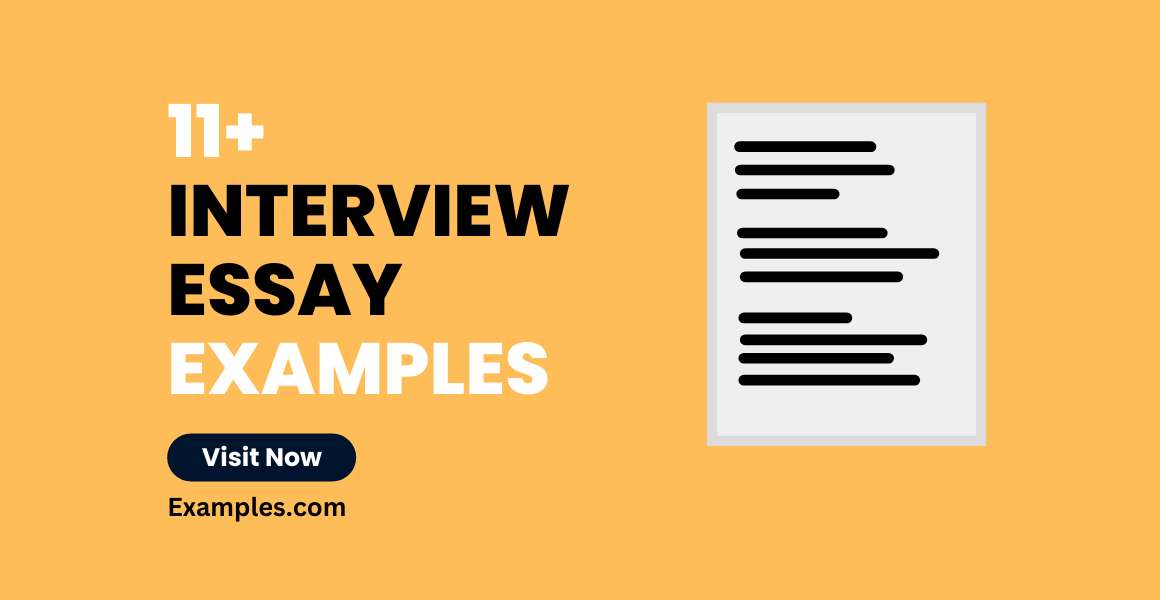
Essay writing is different for everyone. Some people choose to go to the library and search for facts on a given subject, while others like to focus on gathering information through personal statements .
During this interview process, interviewers typically ask a series of interview questionnaire that their readers may want to know about. These details are either recorded or jotted down by the interviewee. With what has been gathered, an individual may then write a complete essay regarding the exchange.
Interview Essay Sample
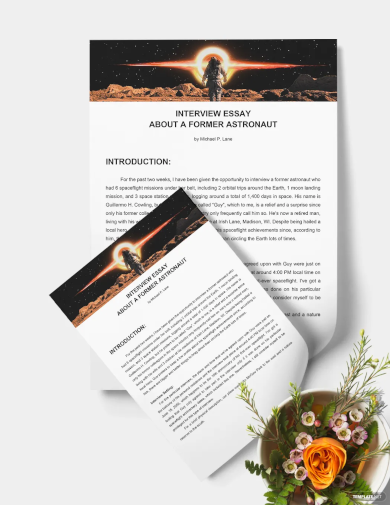
- Google Docs
Size: 168 KB
Personal Interview Essay Template
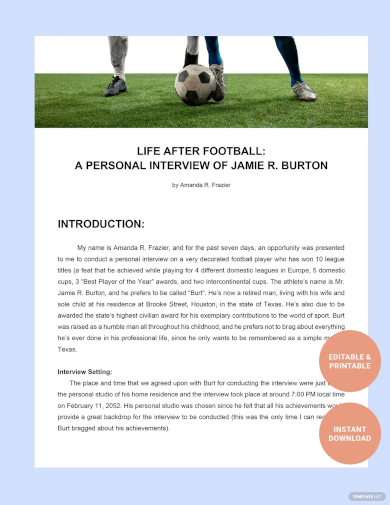
Size: 136 KB
Nursing Interview Essay Template
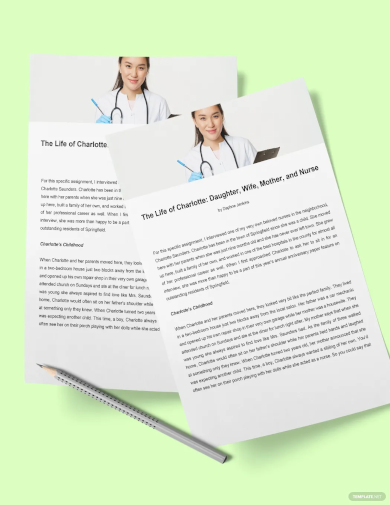
Size: 123 KB
Leadership Interview Essay Template
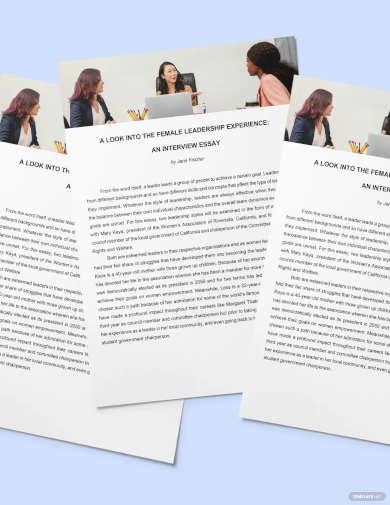
Size: 154 KB
Teacher Interview Essay Template
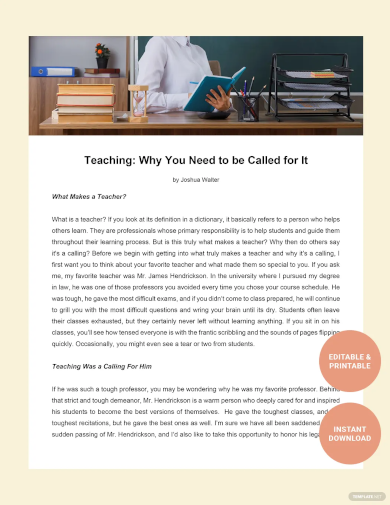
Size: 150 KB
Job Interview Essay Sample
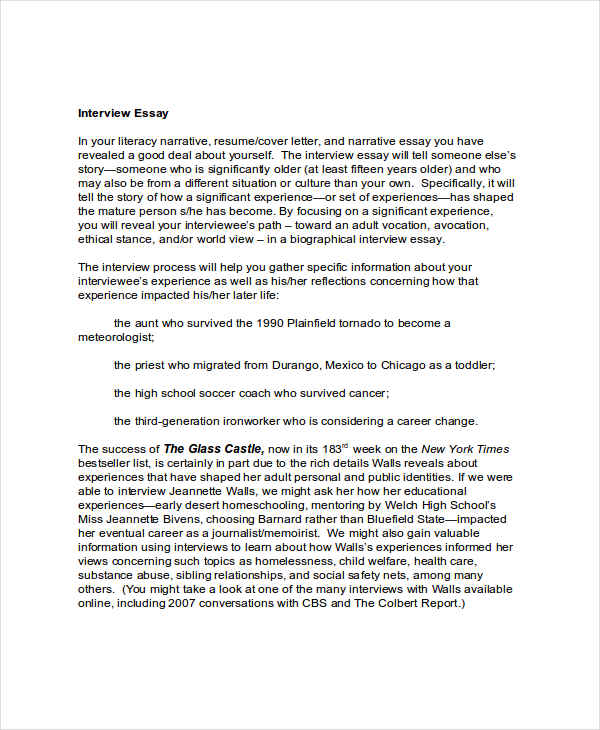
Narrative Interview
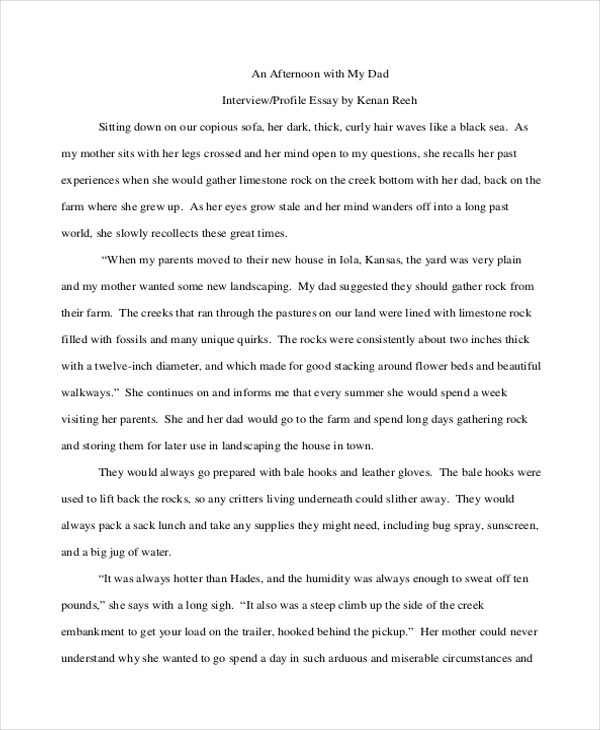
Size: 70 KB
Career Interview Essay
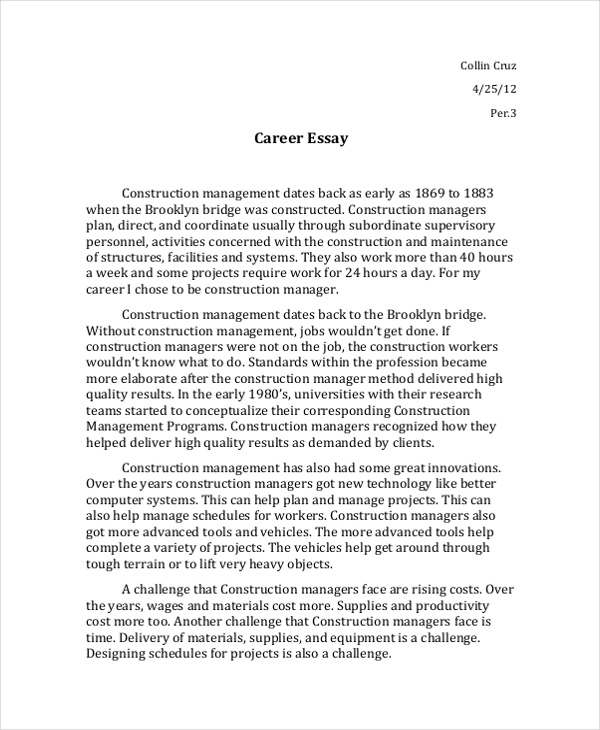
Size: 29 KB
What Is an Interview Essay?
Interview essays are typically based on research gathered from personal testimonies. This could be based on one’s personal experiences or their own input on a given matter. It may be informative essay , descriptive essay , or even persuasive essays , depending on the questions asked by the interviewer.
The content of the essay may include direct quotes from the interview or it may come in a written narrative form. Through this, we are able to gain additional information from a particular perspective.
What to Include in an Interview Essay
For every essay, a thesis statement is needed to help your readers understand the subject being tackled in your work. For an interview short essay , you would need to talk about your interviewee. Any information that will create a credible image for your interviewee will be necessary.
Next, it’s necessary to include the significant ideas that you have acquired from your interview. Ideally, you should pick three of these ideas, elaborate what has been said, and present it in paragraphs. Be sure to emphasize these points in a detailed and concise manner, a lengthy explanation might be too redundant. You may also see sample essay outlines .
Leadership Essay
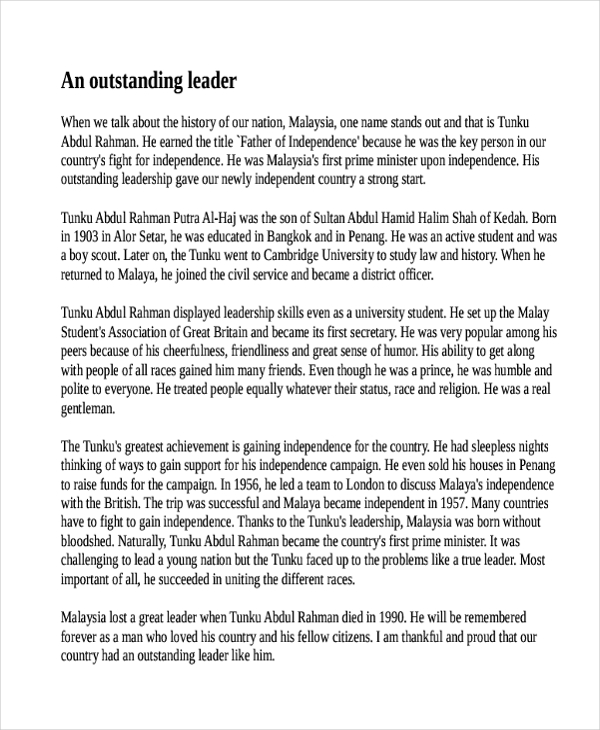
Size: 24 KB
Nursing Interview Example
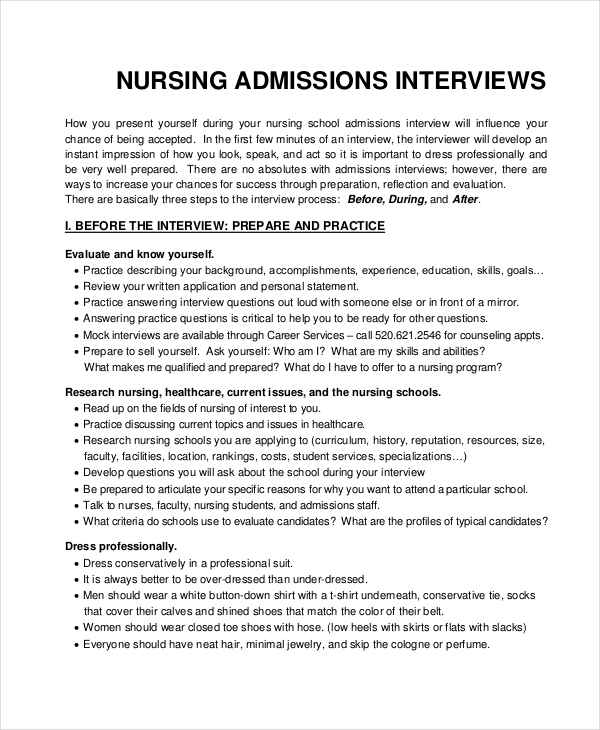
Size: 146 KB
Personal Interview
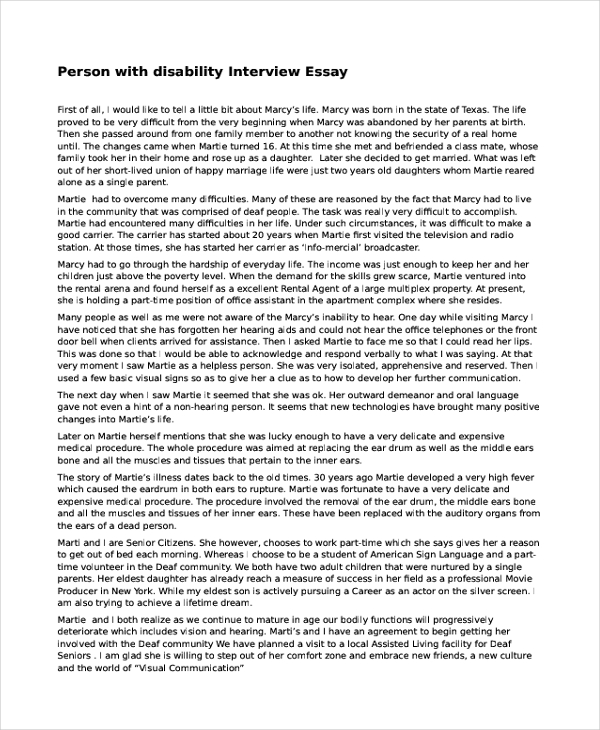
Size: 18 KB
Parent Interview Sample
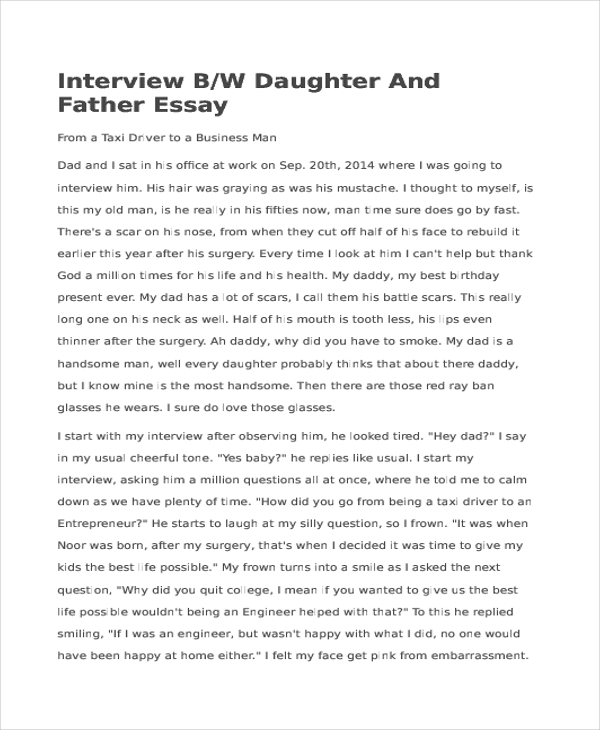
Size: 15 KB
Guidelines for an Interview Essay
When writing an interview essay, it would be best to create an outline first.
Organize the information you have gathered from your interviewee and structure it in a logical order. This could be from one’s personal information to the most compelling details gathered. Be reminded of the standard parts of an essay and be sure to apply it to your own work.
Even when most, if not all, of your essay’s content is based on what you have gathered from your interviewee, you would still need to create a good starting of essay and end to your essay.
Additionally, do not forget to put quotation marks around the exact words used by your interviewee. It would also be best to proofread your work and make sure that there is a smooth transition for each thought. You may also like personal essay examples & samples.
How to Conclude an Interview Essay?
You can end your interview essay how ever you wish to do so. It could be about your learning from the interview, a call to action, or a brief summary writing from what has been expressed in the essay.
But keep in mind, this would depend on your purpose for writing the essay. For instance, if you interviewed a biologist to spread awareness about mother nature, then it would be best to conclude your essay with a call to action. Knowing this, it’s important to end your essay well enough for it to be memorable.

Interview Essay Generator
Text prompt
- Instructive
- Professional
Write an Interview Essay on a local community leader.
Discuss the career journey of a teacher in your Interview Essay.
Using an interview in a research paper
Consultant contributor: Viviane Ugalde
Using an interview can be an effective primary source for some papers and research projects. Finding an expert in the field or some other person who has knowledge of your topic can allow for you to gather unique information not available elsewhere.
There are four steps to using an interview as a source for your research.
- Know where and how to start.
- Know how to write a good question.
- Know how to conduct an interview.
- Know how to incorporate the interview into your document or project.
Step one: Where to start
First, you should determine your goals and ask yourself these questions:
- Who are the local experts on topic?
- How can I contact these people?
- Does anyone know them to help me setup the interviews?
- Are their phone numbers in the phone book or can I find them on the Internet?
Once you answer these questions and pick your interviewee, get their basic information such as their name, title, and other general details. If you reach out and your interview does not participate, don’t be discouraged. Keep looking for other interview contacts.
Step two: How to write a good question
When you have confirmed an interview, it is not time to come up with questions.
- Learning as much as you can about the person before the interview can help you create questions specific to your interview subject.
- Doing research about your interviewee’s past experience in your topic, or any texts that they have written would be great background research.
When you start to think of questions, write down more questions than you think you’ll need, and prioritize them as you go. Any good questions will answer the 5W and H questions. Asking Who, What, When, Where, Why, and How questions that you need answered for your paper, will help you form a question to ask your interviewee.
When writing a good question, try thinking of something that will help your argument.
- Is your interviewee an advocate for you position?
- Are they in any programs that are related to your research?
- How much experience do they have?
From broad questions like these, you can begin to narrow down to more specific and open-ended questions.
Step three: The interview
If at all possible, arrange to conduct the interview at the subject’s workplace. It will make them more comfortable, and you can write about their surroundings.
- Begin the interview with some small talk in order to give both of you the chance to get comfortable with one another
- Develop rapport that will make the interview easier for both of you.
- Ask open-ended questions
- Keep the conversation moving
- Stay on topic
- The more silence in the room, the more honest the answer.
- If an interesting subject comes up that is related to your research, ask a follow-up or an additional question about it.
- Ask if you can stay in contact with your interview subject in case there are any additional questions you have.
Step four: Incorporating the interview
When picking the material out of your interview, remember that people rarely speak perfectly. There will be many slang words and pauses that you can take out, as long as it does not change the meaning of the material you are using.
As you introduce your interview in the paper, start with a transition such as “according to” or other attributions. You should also be specific to the type of interview you are working with. This way, you will build a stronger ethos in your paper .
The body of your essay should clearly set up the quote or paraphrase you use from the interview responses,. Be careful not to stick a quote from the interview into the body of your essay because it sounds good. When deciding what to quote in your paper, think about what dialogue from the interview would add the most color to your interview. Quotes that illustrate what your interviewer sounded like, or what their personality is are always the best quotes to choose from.
Once you have done that, proofread your essay. Make sure the quotes you used don’t make up the majority of your paper. The interview quotes are supposed to support your argument; you are not supposed to support the interview.
For example, let’s say that you are arguing that free education is better than not. For your argument, you interview a local politician who is on your side of the argument. Rather than using a large quote that explains the stance of both sides, and why the politician chose this side, your quote is there to support the information you’ve already given. Whatever the politician says should prove what you argue, and not give new information.
Step five: Examples of citing your interviews
Smith, Jane. Personal interview. 19 May 2018.
(E. Robbins, personal communication, January 4, 2018).
Smith also claimed that many of her students had difficulties with APA style (personal communication, November 3, 2018).
Reference list
Daly, C. & Leighton W. (2017). Interviewing a Source: Tips. Journalists Resource.
Driscoll, D. (2018 ). Interviewing. Purdue University
Hayden, K. (2012). How to Conduct an Interview to Write a Paper . Bright Hub Education, Bright Hub Inc.
Hose, C. (2017). How to Incorporate Interviews into Essays. Leaf Group Education.
Magnesi, J. (2017). How to Interview Someone for an Article or Research Paper. Career Trend, Leaf group Media.

How To Answer MBA Interview Essay Questions
Nov 1, 2023

Harvard Business School’s Post-Interview Reflection
Mit sloan’s interview essays, chicago booth’s pre-interview video essay, yale som’s pre-interview quote, make sure you succeed in any mba interview.
UPDATE : This article was originally posted on November 22, 2018. It has been updated with 2023/24 information and tips below.
After spending months fine-tuning your MBA application essays, you’ve finally received that long-awaited interview invitation — only to discover that now you need to write more essays!
Though not all schools utilize interview essays – essays that are required only of candidates invited to interview – they have become increasingly popular in recent years. With more and more competitive candidates applying every year, elite MBA programs are always looking for new ways to distinguish the “admits” from the “dings.”
Though they may seem small and relatively unimportant at first, MBA interview essays are an important element of your overall application and should be carefully crafted. That’s why we’re sharing our top tips on how to approach and write your own MBA interview essays . By following these tips, you can ensure you stand out and land a spot at your dream school.

Harvard’s post-interview reflection is perhaps the most well-known example of an MBA interview essay. Now with a suggested word limit, this open-ended question must be answered by all candidates that are selected to interview at HBS .
As part of the application process, you will be required to complete a Post-Interview Reflection. Here are a few details:
- The Post-Interview Reflection is not intended to be another formal essay. Think of it instead as a reflection after a meeting.
- We will be much more generous in our reaction to typos and grammatical errors than we will be with pre-packaged responses. Reflections that give any indication that they were produced before you had the interview will raise a flag for us.
- We do not expect you to solicit or receive any outside assistance with this exercise.
- Your Post-Interview Reflection is due within 24 hours of the conclusion of your interview. Let the interview soak in a little bit…no need to start writing your reflection right at the conclusion of your interview.
- There is a word guidance of 300-450 words for the Post-Interview Reflection.
How to approach your answer
Since you only have 24 hours after your interview to prepare the essay, you might be tempted to write out your answer in advance and then make small adjustments later on.
I personally love HBS’ admissions process because the school is incredibly clear and transparent about its expectations. For your essay, they couldn’t make it clearer that a pre-packaged answer will hurt your application:
“ We will be much more generous in our reaction to typos and grammatical errors than we will be with pre-packaged responses. Reflections that give any indication that they were produced before you had the interview will raise a flag for us. ”
That’s because the Post-Interview Reflection (PIR) works best when it’s just that – a reflection on how your interview with the school actually went .
Though we’re sure you diligently prepared for your big day , interviews have a way of going a little differently than expected.
Last year, for example, our client Nathalia’s interview was so focused on her new international job that she only later realized she’d never told her interviewer her reasons for wanting to attend Harvard. In her PIR, she was able to address this topic, as well as a few other points mentioned in the interview that she wanted to further expand/clarify upon.
This approach helped Nathalia get into HBS.

As such, the best strategy for your PIR is to do your best on interview day and then calmly assess your performance afterward. After reflecting, you should consider including the following elements in your PIR:
- A brief thank you for the opportunity to interview
- Any points you feel are relevant but were not able to discuss in the interview
- Any “mistakes” you’d like to correct or additional points you’d like to add
- How you feel you can contribute to the HBS community (if you were not able to mention this)
- Anything you learned about HBS during the interview or during your campus visit (if you interviewed in Cambridge)
- A closing paragraph that reinforces why you are so passionate about attending HBS.
Essentially, after reading your PIR, the admissions committee at HBS should be convinced that you deeply reflected on your interview and your place in the HBS community, demonstrating you are exactly the type of candidate they are looking for!
Finally, though the HBS admissions committee states that they are more understanding of spelling and grammar errors, try to run your essay through software like Grammarly to avoid any unnecessary mistakes.

Photo courtesy of @mitsloan on Instagram
MIT Sloan has also long required candidates who are called to interview to submit an additional essay. This year, MIT Sloan’s interview question is as follows:
REQUIRED QUESTION #1 (DIVERSITY)
The mission of the MIT Sloan School of Management is to develop principled, innovative leaders who improve the world and generate ideas that advance management practice. We believe that a commitment to diversity, inclusion, equity, and well-being is a key component of both principled leadership and sound management practice.
In 250 words or less, please describe a time when you contributed toward making a work environment or organization more welcoming, inclusive, and diverse.
At MIT, diversity is a core value . This means that at Sloan, you’ll constantly interact with people who think and act differently than you do.
Succeeding in such an environment requires a great deal of adaptability and flexibility, as well as a willingness to learn from those who are different. This type of environment, however, is not for everyone, which is why MIT seeks to gauge how you respond to diversity in this essay.
We suggest you start by considering the brand you are presenting to MIT and examine which examples about diversity you can share that will add value to the stories you told in your cover letter and video. Then, make sure you narrow this list down to your single best story . In a 250-word essay , you won’t have time to fully explore multiple examples, so limit yourself to one killer story.
REQUIRED QUESTION #2 (DATA)
We are interested in learning more about how you make data-driven decisions and communicate results. Please select one of the following prompts to respond to.
- Please select an existing data visualization and in 250 words or less explain why it matters to you. The data visualization should be uploaded as a PDF. Examples may come from current events, a business analysis, or personal research (e.g. climate change, COVID maps, etc).
- In 250 words to less, please describe a recent data-driven decision you had to make, and include one slide presenting your analysis. The slide may include a data visualization example and should present data used in a professional context. Your slide must be uploaded as a PDF.
Considering how short the MIT application is, you should also use this as another opportunity to add something new to your application.
With this question, MIT seeks to understand how you are able to use data to make important decisions. MIT states that this example should come from data used in a professional context, so keep this in mind. When designing your slide, remember that you’re being judged on how you present the information visually, not on the data itself.
In your essay, make sure to explain how you analyzed the data and used it to make a decision . If you are not able to show how you applied the insights gained from the data you presented in a clear, concrete way, you may want to consider a different approach. If you don’t have a job that requires you to use data on a regular basis, question 1 would be a better fit for you. If you do use data frequently at work, question 1 may still be a good option, but showing a real and measurable way in which you used data to make a decision is an excellent way to show the adcom you possess a great fit with their program.
TOP TIP: Make sure not to share confidential information. If you need to “sanitize” the data, this is acceptable.
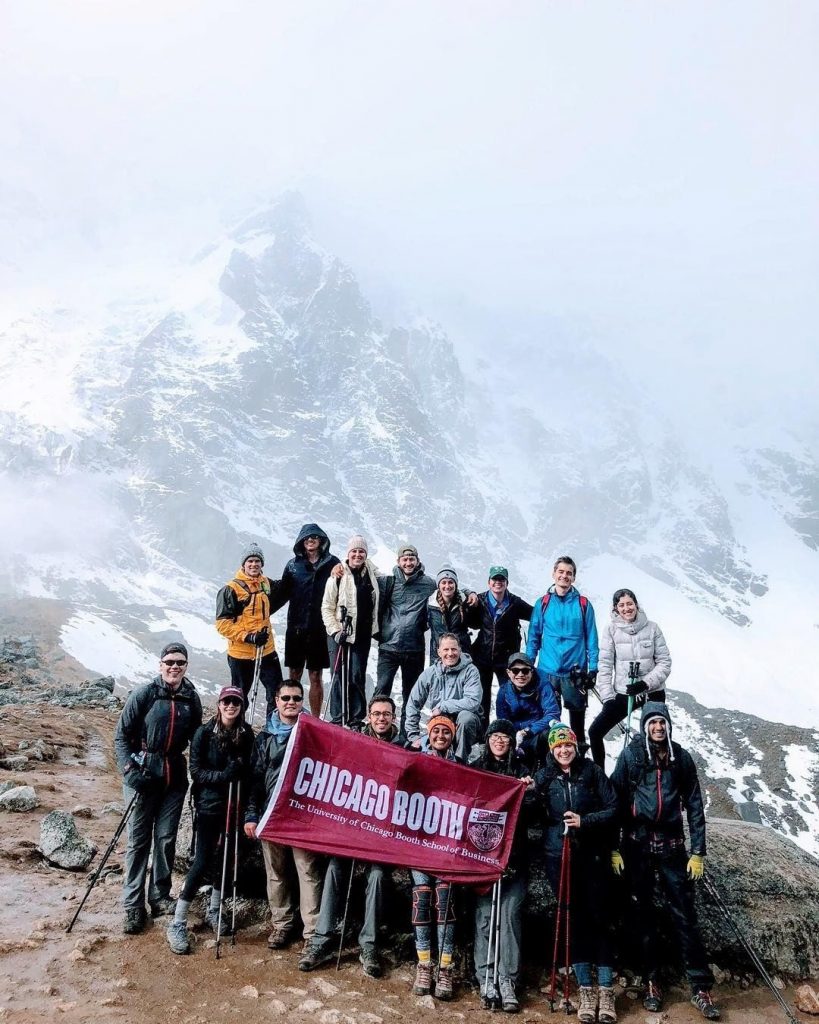
Photo courtesy of @chicagobooth on Instagram
For several years running, Booth has asked candidates who move to the next application phase to submit additional materials before the interview. Like last year, you’ll need to submit your response in video format.
Please submit a video response to one of the following two prompts:
- Tell us about something new you learned recently that shifted your worldview. How did it influence your behavior and/or actions?
- What is something you wish people knew about you, but you’re not sure that they do?
Please note the following:
- The length of the video response should be no more than 60 seconds.
- You will not be evaluated on the styling and editing of the recording, only the content of your submission.
- Feel free to record the video with a cellphone, computer, or other video recording device.
The most important task is first considering which prompts you will choose from each category , especially considering there is space for repeating themes.
When looking at each category, choose the question that is both easiest to answer and that allows you to shed light on a new element of your profile. If you’ve already mentioned community service in one question, for example, perhaps avoid repeating community service as the theme in other answers.
Most importantly, consider what you want Booth to learn about you . Booth’s application – like its curriculum – is incredibly flexible , but it does mean that you can end up repeating themes from your essays unless you’re very careful and strategic in how you use each and every word the interview essays give you.
Then, after choosing your best stories, use a condensed version of the STAR methodology to walk your reader through what your example is before ending with a final lesson or takeaway.
TOP TIP : Start your video script by simply writing out the story and then refining the content/length. In our experience, applicants can comfortably speak 160-180 words in 60 seconds. You may also want to review some of these best practices to ensure you’re ready for your video debut.

This is the first year that Yale SOM has asked candidates to send additional information when they are called to interview, though their format is highly unusual compared to the other business schools.
Please submit a quote that has a special meaning or resonates with you. We ask that you submit this no later than 24 hours prior to your interview day.
Considering Yale SOM’s focus on values (after all, their essay question does ask you for the greatest commitment you’ve ever made), we see this as one more opportunity for you to demonstrate what motivates and drives your actions to Yale.
Since they specifically did not ask for an essay along with the quote, we would imagine that the quote will factor into your admissions interview. Likely, the admissions committee will ask you why you chose the quote you did, so think carefully about how you would approach the quote in this context.
As such, think about the story you might be able to connect to this quote and carefully consider how this story will add value to your profile. For example, if you volunteer, you may want to choose a quote that one of the people you helped said to you, as this can unlock the possibility to dive deeper into your extracurricular activities.
Though you might not be practicing for your interviews, your competitors are. When you’re competing at such an elite level (and top MBA programs are about as elite as it gets), practice is the only way to get the edge you need.
Working with highly-trained professionals, like our team of interview experts, can also be an excellent step to include in your interview process.
- Maybe you don’t know where to start preparing.
- Maybe you ramble on and lose your focus while answering.
- Maybe you’re concerned about making errors, discussing your strengths, or addressing weaknesses.
- Maybe you’ve downloaded interview guides or have spent hours reading interview report forums—but still have questions and doubts.
Our interview prep and practice service focuses on helping you determine what to highlight in your interview depending on the program while using appropriate, impact-driven language without being artificial, or worse, robotic. We also help you choose (and perfect) culturally appropriate examples based on the schools you’re interviewing for.
As our former client Helena said:
“ My husband and I applied for an MBA at INSEAD this year. We knew it would not be easy since we had a very small window, were applying in the 3rd round and only wanted this specific school.
Ellin helped us with the preparations for the interviews and she really helped me organize my story, but the most special aspect was how Ellin inspired me to be more confident during the interviews. I would definitely recommend her to anyone interested in applying for an MBA! ”

Real MBA Essays That Got People In
School-specific sample essays that got our clients accepted
Get Access Now

98.9% Success Rate
With our expertise and 98.9% success rate in placing our consulting clients in at least one of their target schools, we can add more value to your application than you ever thought possible.
Recent Articles

Essay Editing Tips from the Pros: Preparing for Your MBA Journey
Mar 14, 2024
Importance of Essay Editing in MBA Applications Common Mistakes to Avoid in MBA Essays Strategies for Effective MBA Essay Editing Understanding the MBA Essay Requirements Key Elements of a Strong MBA Essay...

How to Use MBA Rankings Effectively to Find Your Perfect Fit
Feb 28, 2024
Understanding the Landscape of MBA Rankings What Does the Latest FT Ranking Show? Why Business School Rankings are Not Perfect Shifting The Paradigm With Personalization Beyond Numbers: Finding Your School Culture...

London Business School Guide: Everything You Need To Know
Feb 21, 2024
School and Program Overview Employment Information Is LBS Right for You? Academics at London Business School Networking and Extracurricular Activities What Makes LBS Special? LBS Resources To Help You Get Accepted...
Ready to start your MBA Success?
- SUGGESTED TOPICS
- The Magazine
- Newsletters
- Managing Yourself
- Managing Teams
- Work-life Balance
- The Big Idea
- Data & Visuals
- Reading Lists
- Case Selections
- HBR Learning
- Topic Feeds
- Account Settings
- Email Preferences
38 Smart Questions to Ask in a Job Interview

And a few to avoid.
The opportunity to ask questions at the end of a job interview is one you don’t want to waste. It’s both a chance to continue to prove yourself and to find out whether a position is the right fit for you. In this piece, the author lists sample questions recommended by two career experts and divides them up by category: from how to learn more about your potential boss to how to learn more about a company’s culture. Choose the ones that are more relevant to you, your interests, and the specific job ahead of time. Then write them down — either on a piece of paper or on your phone — and glance at them right before your interview so that they’re fresh in your mind. And, of course, be mindful of the interviewer’s time. If you were scheduled to talk for an hour and they turn to you with five minutes left, choose two or three questions that are most important to you. You will always have more time to ask questions once you have the job offer in hand.
“So, do you have any questions for me?”
- Amy Gallo is a contributing editor at Harvard Business Review, cohost of the Women at Work podcast , and the author of two books: Getting Along: How to Work with Anyone (Even Difficult People) and the HBR Guide to Dealing with Conflict . She writes and speaks about workplace dynamics. Watch her TEDx talk on conflict and follow her on LinkedIn . amyegallo
Partner Center
6 Surprising Ways to Write Better Interview Questions
by Joe Bunting | 23 comments
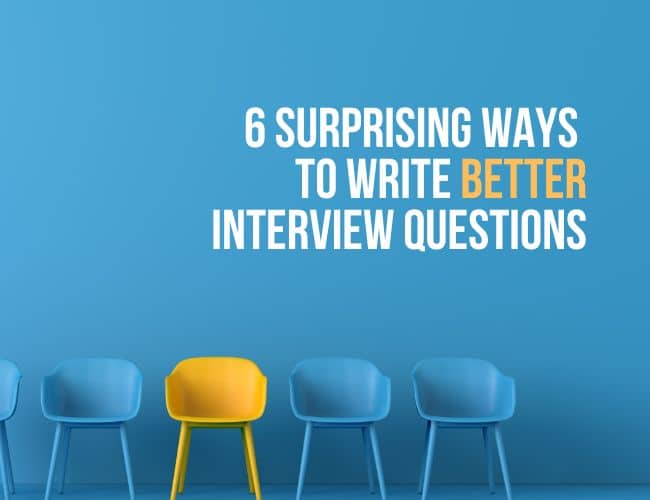
Interviews are a great way to practice your writing skills, regardless of the genre you work in. But how can you write interview questions that produce effective conversations? Read on to hear some expert advice on building an interview process and how to write interview questions that produce better conversations and writing.

The Magic of an Interview
Interviews are far more than a tool for a hiring process. For writers, interviews produce ideas, voice, and more. But in an actual interview, you want to have a conversation, not an interrogation. A good interviewer makes their interviewee comfortable.
Going back to your list of interview questions all the time can rattle the person you're interviewing. Your interview shouldn't be something the person could have answered via email. The questions should prompt a conversation that extends beyond the prepared questions.
So how do you get your interviewee comfortable? How do you prep questions that prompt conversations?
I love this story from Porter Anderson :
I interviewed Cokie Roberts (the Emmy-winning journalist) once for a magazine. I asked her about all the needlepoint she had in her office. She grabbed a piece she was working on, a duck, and worked on it as we chatted. We found out her favorite vacation spot wasn't far from my home sea island off the South Carolina coast.
Your ability to be present, to keep your nose out of your notebook, will make your interviews shine with life.
To be more present, I always write out about a dozen questions before going into a face-to-face or phone interview. President Eisenhower said, “In preparing for battle I have always found that plans are useless, but planning is indispensable.”
Your questions are your battle plans. You might not use all of them, but they prepare your mind for the task ahead and set you up for a more effective conversation.
How Do I Write Better Interview Questions?
I asked a panel of writing friends what kinds of questions they ask in interviews. Here are six pieces of expert advice to help you write better questions:
1. Ask about the person's actions.
“It depends on the person, but usually I ask them about their specific habits and practices ,” says Jeff Goins. “I'm less interested in what they would write in a book and more interested in how they try to apply the ideals they write or speak about.”
Jeff is trying to get under a person's rhetoric to see the routines they've cultivated to be successful. If you can get people to describe their actions rather than their beliefs about themselves, you'll see a clearer picture of them, one unmarred by slogans. Whether it's handling a stressful situation or the habits that developed their leadership skills, routines reveal a lot about a person.
2. Ask “forward” questions.
Porter Anderson suggests focusing the interview on the here and now and future.
“The past, unless your interviewee is relatively unknown, is research-able. Keep in mind that as much as we all may like our laurels, resting on them is never as interesting as diving off them into a new pool. The reminiscence interview is never as cool as it sounds.”
“The ‘What's the best part of the next thing you're doing?' question will engage your subject's current, forward-looking energy. You get a more excited interviewee, who wants to tell you what she or he is into.”
Asking about a future position or prospect lets your interviewee know you're interested in more than what they've accomplished in the past.
3. Ask open-ended questions.
Morgan's goal is to get athletes and coaches talking, so he avoids closed questions that only require a short answer.
“I try to ask open-ended questions that can't be answered with a simple ‘yes' or ‘no,'” he says. “I also ask people to explain to me certain aspects. Such as, ‘describe how this team came together this season.'”
“I also say ‘how' a lot. For example, ‘How was your first-ever varsity start at quarterback?'”
What a cool idea: to get them talking, just write the word “HOW” in bold letters at the top of your list of questions. Every time you look at it, ask, “How?”
“How do you do that? How do you feel about that? How did it go?”
Asking “how” opens the conversation to learning and process.
4. Ask dumb questions.
“Dumb questions are my favorite,” says Marissa Villa. “Today, I asked someone, ‘Um, what does that mean?' when he used an abbreviation. You can't be afraid to ask dumb questions.”
If you're confused, don't move along to the next question. Ask for clarification, even if you think you sound stupid. You don't want to start writing your article and then realize you don't know what you're talking about because you were confused during the interview.
“It also strokes people's egos when you tell them they're the expert and you want to learn from them,” says Marissa.
Again, in a conversation, you don't fire off a list of questions without stopping. Your goal is to understand the person better, so don't be afraid to ask for an explanation when you need it.
5. Ask pointed questions and light-hearted questions.
When you prepare, go beyond common interview questions and try to mix up the tone of your questions. Don't be afraid of the tough questions, but also allow for less serious questions as well.
“I try to ask a few pointed questions that contrarians might ask,” says Jeff. It's always good to poke a little, as long as you don't go too far. “And throw in the occasional light-hearted question for fun,” he says.
This is a good way to tailor your interview to your audience. Do your research and see what the person has already covered in previous interviews. Then consider your audience and what parts of your interviewee's story or experiences will most resonate with them.
6. Ask short questions and then follow up.
Don't try to pack all your questions into one super-mega question. “Instead of asking a long-winded question,” says Morgan, “split it up into two parts. Follow up questions can be key.”
Not only are shorter related easier to process for your interviewee, they ensure you get answers for all parts of the question instead of limiting your interview process when the person only answers one part.
Your Turn to Ask the Questions
Whether you're working on nonfiction, a memoir, or even fiction, interviews are a great way to grow your creative writing and communication skills at the same time. Go the extra mile to make your interview subjects feel comfortable and use these tips to write some amazing interview questions.
You might be surprised by not only by all you can learn from the answers to questions, but also by your own enjoyment in the moment.
How about you? What kinds of questions do you ask? Let us know in the comments .
Back to How to Conduct an Interview Like A Journalist .
Today, we're going to come up with a lot of questions. Fifty questions, actually. Then we're actually going ask someone a few of them. Sound fun?
Set the timer for 15 minutes.
First, let's come up with a person to interview, some local figure. How about the mayor of your town, or a columnist for a local newspaper, or maybe the person in charge of the city dump? Pick someone with an email address that's easy to find.
Next, imagine that local figure is your hero. You're almost obsessed with the trashman, for example. You're fascinated about their dump truck. You want to know about every piece of trash they've ever picked up. Why? Because at least half of good journalism, in my opinion, is curiosity, and it's easier to be curious about someone you admire.
Then, start brainstorming questions. Come up with forward questions, open-ended questions, questions about their actions. Brainstorm pointed questions and light-hearted questions. You should even think of a few dumb questions.
When you get to fifty, pick out your favorite five, and write out an email to your little local hero. Say you're on assignment for the Write Practice. Post your questions in the Pro Practice Workshop here with the info about who you'll send them to.
Joe Bunting
Joe Bunting is an author and the leader of The Write Practice community. He is also the author of the new book Crowdsourcing Paris , a real life adventure story set in France. It was a #1 New Release on Amazon. Follow him on Instagram (@jhbunting).
Want best-seller coaching? Book Joe here.

23 Comments
What a great post! Useful and on point as well as specific. Thank you!
Thanks Cindi!
Great article, Joe! I’m a copywriter so interviewing is a key part of my job, but as an introvert it’s also one I struggle with a lot. Excellent tips.
I’m actually working on writing questions right now for my first ever interview for my blog. I’ll be interviewing a musician/speaker (and soon to be author) who I like, and whom I’ve met in person once. This advice is all very helpful, since I’m really nervous about coming up with good questions.
It sounds fun, Susie. I always get nervous before interviews, but they almost always end up going well. Good luck!
“Ask ‘forward’ questions” is a gem! I have a list of standard questions and I’ll review them with this in mind. It’s a great tip.
Do you have a good online source with a list of questions to get me started with interviewing my client for his book?
hi may i know when you wrote this article? it’s for crediting 🙂
Hi Ray. Sure thing! September 22, 2011.
Spinal Arachnoiditis is a spinal cord injury caused by the neurotoxins in spinal injections and invasive spinal procedures. I am a Survivor and an Advocate for prevention and founder of Art For Arachnoiditis. Today I am doing my first Survivor Interview and Photo Session for the project: Arachnoiditis Survivor:A Portrait of Resilience Against Patient Harm In America. This is my first EVER official interview. Your tips have been very helpful. Thank you! The project is here: http://sheilalynnkart.com/section/390864_Living_With_Arachnoiditis_An_Art.html
I believe this may have saved my life! Thank you so much. I am recording my first interview for my YouTube channel (Sippin Tea Wit D) and I have written so many questions out for this personal trainer, but none sounded up to par. Now I have a clearer understanding! Thanks! Dianwilliams.com
Thanks so much, this has been a big help!
very informative i love it
I’m not a journalist of any sort, I just started a youtube Vlog and realised that I had no clue how to conduct an interview. This was very informative and i feel more confident now. Thank you.
Thanks so much for the helpful advice! I’m really excited to start talking with people about simple and sustainable living and how they pull it off in their own worlds.
Really great article, thank you so much!! Really changed the way I plan to approach an interview.
Thank you very much, I’m going to do my first interview, I’m a bit excited , I’ll use your advice, I hope I’ll go well
This is a good article on ways to ask better questions in interviews. For a list of standard (common), behavioral, and problem solving interview questions with ways to answer them, check out: http://questionsininterview.com/
Trackbacks/Pingbacks
- How to Conduct an Interview Like a Journalist | The Write Practice - [...] Six Ways To Ask Better Questions in Interviews [...]
- The One Secret to a Deeper Memoir | The Write Practice - [...] if you’re writing a memoir, what if you interviewed people–friends, family, community members–about the events on which you’re writing?…
- Eleven Habits of Highly Effective Interviewers | The Write Practice - [...] Dumb questions make for great interviews [...]
- Your Questions About Good Questions To Ask During The Question Game Girls | Stop Jealousy - [...] Questions About I Can T Stop Existence DepressedProduct Sneak Peek: Box Girls Family Road TripSix Ways to Ask Better…
- Practicing Interviewing Skills in Unlikely Places | Media Editing - [...] Practice does make perfect when it comes to interviewing. So, how and where have you practiced your interviewing skills?…
- 100 Writing Practice Lessons & Exercises - […] Six Ways to Ask Better Questions In Interviews […]
- 5 Shortcuts to Becoming an Online Influencer | ProminentSocial - […] you are oblivious about the kind of questions that you need to ask your prospects, then this guide should…
- 5 Shortcuts to Becoming an Online Influencer - […] you are oblivious about the kind of questions that you need to ask your prospects, then this guide should…
- Informational Interview Assignment – FYS 201 02S - […] https://thewritepractice.com/six-ways-to-ask-better-questions-in-interviews/ […]
- Six Ways to Ask Better Questions in Interviews – Janelle's Blog - […] From thewritepractice.com […]
- 3 Steps to Hiring THE BEST Dental Team | The Wealthy Physician - […] The Scnerario driven Interview…First with the Doc, then with the […]
- Bibliography – pdpsophiejardin - […] J. (2011) Six ways to ask better questions in interviews. Available at: https://thewritepractice.com/six-ways-to-ask-better-questions-in-interviews/ (Accessed: 9 August 2016).In-line Citation:(Bunting, […]
- Research Bibliography – My Methods & Why Am I Using Them – – NHI NGUYEN - […] Bunting, J 2011, Six Ways to Ask Better Questions in Interviews, The Write Practice Blog Post, 22 September, viewed…
- Intro to JRN: Interviewing 101 | Ms. Mullins' English/Journalism/TV Production Classroom Website - […] are some more links to helpful information/reminders when interviewing. We will be interviewing a lot over the rest of…
- Ulrike Werner, The Art of Asking – Jessie Bouma - […] https://thewritepractice.com/six-ways-to-ask-better-questions-in-interviews/ […]
- 3 Steps to Hiring THE BEST Dental Team – IgniteDDS - […] The Scnerario driven Interview…Doc, then […]
- 21 Life Skills All Girls Should Know Before Adulthood - […] Interview practice makes a huge difference believe it or not. An old schoolmate of mine took an entire day off…
- How to create a good interview – CharlottesFinalMajorProjectY2 - […] https://thewritepractice.com/six-ways-to-ask-better-questions-in-interviews/ […]
- Tuesday Aug 27th | Broadcast Journalism - […] 6 Ways to Ask better Questions […]
- How to Interview Job Candidates - Includes Free Interview Guides - […] you ask a candidate how they would respond to a specific scenario. Good interview questions are forward-thinking, open-ended, and…
- Intro to JRN: Interviewing – Mrs. Kane's English/Journalism/Newspaper/TV Production Classroom Website - […] Six ways to Ask Better Questions in an Interview […]
- A Sensible Social Media Checklist for Businesses | Cleverism - […] Interviews – you could also organize for interviews. And just as with questionnaires, keep them short. Remember that you…
- The Art Of Asking Questions | BloggingJar | Jar - […] as TheWritterPractice said in their article "In an interview, you want to have a conversation, not an interrogation. A…
Submit a Comment Cancel reply
Your email address will not be published. Required fields are marked *
Submit Comment
Join over 450,000 readers who are saying YES to practice. You’ll also get a free copy of our eBook 14 Prompts :
Popular Resources
Book Writing Tips & Guides Creativity & Inspiration Tips Writing Prompts Grammar & Vocab Resources Best Book Writing Software ProWritingAid Review Writing Teacher Resources Publisher Rocket Review Scrivener Review Gifts for Writers
Books By Our Writers

You've got it! Just us where to send your guide.
Enter your email to get our free 10-step guide to becoming a writer.
Get the Perfect Interview Checklist for Writers
Enter your email for a free checklist with 12-Steps to a perfect interview!
You've got it! Just us where to send your book.
Enter your first name and email to get our free book, 14 Prompts.
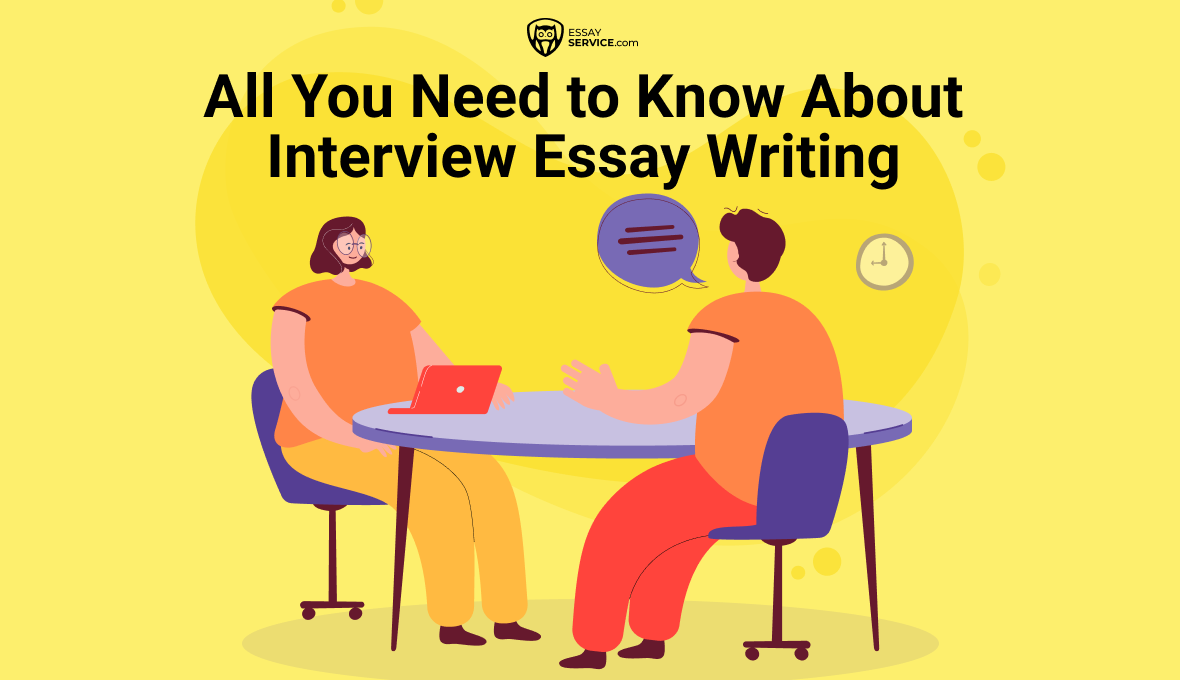
All You Need to Know About Interview Essay Writing

Purpose of Writing an Interview Essay
The writing process is not always smooth sailing. When it comes to the construction of interview papers, you are free to ask about myriads of issues of your interests and get a broad insight from the interview subject. Once you figure out the main thesis statement for your interview essay, you must collect relatable data in question-and-answer format. The gathered information is almost always subjective since the authoritative individuals and qualified experts are your main data providers. Interview essays are constructed based on people's biased opinions rather than books, historical records, and other sources.
Are you looking for answers on how to write an outline for interview essay? We are here to provide you with useful tips on how to write interview APA format essay.
You might as well find this article helpful since we have prepared essay writing in interview sample at the end of it.
Format for Writing an Interview Essay
Are you on the verge of choosing an appropriate format to write an interview essay? One of the essential steps includes identifying the type of interview paper you are willing to write. The interview essay format is determined based on the style of your paper. There are three basic types of interview papers:

- Narrative Essay Interview - Through this type of paper, you are assigned to research a specific topic based on the conducted interview. The main thing is to accumulate all the information that the interviewed person has provided in a neat and organized manner in the form of a narrative. The story might be written from your perspective or that of the interviewee. In that case, you are free to write in the first and second person.
- Personal Interview - Such type of paper demands you to prepare a list of witty interview questions to ask a specific person who holds a certain type of authority based on their professional occupation. The final product turns out to be an interview in essay format.
- Question-answer Interview - Such interview questions are often asked to job seekers. This is your chance to glance through the common interview questions that the hiring managers will ask you to get a glimpse of your personality and career goals. The questions and answers can be combined in an interview paper. For more information, check out internship interview questions and answers here.

How to Write an Outline for Interview Essay
After you have chosen key points for your interview paper and adjusted its format accordingly, you might wonder, 'should I write an outline for an interview essay ?'. The answer is clear and direct - 'Yes, definitely!'
Good writers always prepare an outline in advance, which is a great tip to lift the burden of the time-consuming paper writing process. The basic structure of interview essay outline includes three major parts:

- Introduction - As you state your paper's thesis statement, you can start writing by introducing the person or the people you interviewed.
- Body Paragraphs - The following paragraphs should contain the subjective points of view that your interviewees provided concerning your major thesis statement.
- Conclusion - In the concluding paragraph of the essay, restate the paper's main goal and summarize the most important points you have made so far.
Writing an Interview Essay Introduction
Once you wrap up the interview essay, outline you are ready to start the writing process. Writing a catchy lead and grabbing a reader's attention right away is not a simple task. However, there are some key elements that make up the best of the introduction part of your interview essay. The primary sentence should briefly contain the main objective behind the chosen topic of the paper. The following sentences should report the importance of your essay topic to your target audience. Finally, you can proceed with the thesis statement, which indicates the basic value of your paper. In other words, try to answer the question of what benefits the reader gets from familiarizing themself with your interview paper.
Do not hesitate to ask us to write an essay for me whether you are assigned to construct an interview essay on writing or any other given subject.
Writing an Interview Essay Body Paragraphs
The body paragraphs hold the majority of the essay. Provided paragraphs support the central statement with relatable facts, details, and key points as the answers that an interviewer asks.
Some of the interviewers prefer to use a recording device, while others opt for notes to contain the important data in its entirety. They choose to include parts of the narrative later in the body paragraphs of the essay as they gather the most important and thematic points made throughout the interview process. You might as well include direct quotes or in-text citations as the sources of provided answers. However, always keep in mind to ask for written permission if you plan to paraphrase or directly copy their ideas word by word according to the issue of your interest.
Writing an interview essay can be hard, so if you are looking for further tips on how to write an essay , we can provide you with an interview essay outline example as well as the complete paper itself.
Writing an Interview Essay Conclusion
The classic format for writing an interview essay includes jotting down the main objectives made throughout the paper in a final paragraph, otherwise known as the conclusion. The last paragraph is not any less important compared to the opening one. That is why you should try and restate the crucial points that interviewees have made while answering questions provided by you. That way, you will sound even more persuasive as you provide evident arguments supported by powerful public figures regarded as influential in society.
You are welcome to conclude the essay with a respectful thank you note as well. Express sincere gratification to the reader for taking the time to read your essay and focus on your contribution to them with the source of information contained in the written interview paper.
If you don’t have distinguished skills for writing an outline for college interview essay, our experts have your back! Contact us to write papers for money and enjoy a perfectly-crafted assignment.
Essay Writing Topics in Interview
Looking for inspiration? Researching an interesting topic for the essay can be exhausting sometimes. But we are here to give you a helping hand through tough times. Our experts have gathered some of the most compelling essay writing topics in interview. You are free to take a look at them and choose one that satisfies your curiosity and challenges you to be analyzed in depth.
- Does body language describe our mental state?
- How important is eye contact for establishing genuine connections?
- Are educated and qualified people obliged to give more to others?
- Which job position is the most attractive in the 21st century?
- Do career services help people get to their target job market?
- Does conflict resolution hold an important place in the contemporary world?
- What is love, and where do you feel it or experience it most often?
- How do our family heritage and traditions influence our personalities?
- How many hours of sleep are needed at different stages of life?
- What kind of skills is essential to possess in order to become a good leader?
- Should the tax system be allocated to the rich and poor accordingly?
- Is the two-party system the guarantee of American democracy in the US?
- Should combatting racism be an individual responsibility?
- Should the American people restrict the amount of money spent on the electoral college?
- How do relationships and friendships shape our lives?
- Do your dreams and nightmares reflect real-life events?
- How do you keep yourself from getting sick?
- Does technology make your daily life easier?
- Do you agree or disagree with the idea that opposites attract?
- What does it mean to be a religious and faithful person to you?
We hope those mentioned above, as well as other essay writing topics for interview in google, will fuel your curiosity.
Meanwhile, you can always pay for papers . Our experts are capable of writing an essay for a job interview based on your individual demands that will get you closer to your dream position.
Interview Essay Writing Examples
Here is one of the interview essay writing examples to check out. We hope that the provided example will give you some kind of perspective:
'A LEADER IS ONE WHO KNOWS THE WAY, GOES THE WAY, AND SHOWS THE WAY'
According to the popular idea, leaders are born rather than made. Contrary to this belief, many real-life examples prove that people can grow into a leader type as they grow older if they want to. Any man can be a leader, but it is not an easy thing to do. You need to know yourself to set an example for others, inspire them, and give them a sense of trust to follow your steps. People are inclined toward those who know where they are going, have their own vision, and are educated enough to support their decisions with rational arguments. These traits give leaders the power to be persuasive. They have their goals set and are not afraid to firmly face any challenges that life might throw their way.
To support this statement, we have interviewed a Pakistani female education activist, Malala Yousafzai, who also carries the honor of being the 2014 Nobel Peace Prize laureate. She is a pure example of how one can rise from any kind of social and domestic circumstances if one has a vision and works hard enough to achieve their goals. She realized the value of education from a very young age. The latter was often inaccessible for girls of her nation due to authoritative powers in the head of the government, under which education was banned for almost all the females in the Northern Pakistani region. Malala persistently fought for her truth and raised awareness about the value that educating girls and boys could hold. She began writing articles and her personal insights anonymously to describe the intolerable circumstances that females had to face under the group of dictators, highlighting the purpose of education and its unavailability for girls of Pakistan.
Malala's example is one of a kind. She wants to be remembered as a girl who tries to help others in whatever capacity she can hold. She did everything possible to let the outer world know about the injustice that the government of her nation committed. She never backed down even after the confrontation between her and the representatives of the ruling power at the head of the Pakistani government.
Further Academic Help
We hope you gained some beneficial information throughout this article which will help you craft a top-notch interview essay for your journalism class. In case of further assistance, our expert writers are here to provide you with interview essay examples APA format at our paper service platform.
Before you go, you are welcome to take an essay writing test for interview to check how well you understood the concept of the article and implement gained knowledge into your upcoming assignment.
Frequently asked questions
She was flawless! first time using a website like this, I've ordered article review and i totally adored it! grammar punctuation, content - everything was on point
This writer is my go to, because whenever I need someone who I can trust my task to - I hire Joy. She wrote almost every paper for me for the last 2 years
Term paper done up to a highest standard, no revisions, perfect communication. 10s across the board!!!!!!!
I send him instructions and that's it. my paper was done 10 hours later, no stupid questions, he nailed it.
Sometimes I wonder if Michael is secretly a professor because he literally knows everything. HE DID SO WELL THAT MY PROF SHOWED MY PAPER AS AN EXAMPLE. unbelievable, many thanks
You Might Also Like
.png)
New Posts to Your Inbox!
Stay in touch

IMAGES
VIDEO
COMMENTS
1. Think about your essay's purpose. The first step is to think about your essay's purpose. This consideration can help you determine what questions to ask during the interview, how to conduct it and how to write the resulting essay. For example, you may want to write an interview essay as an informative, factual piece for others to educate ...
Write your questions. Set up a time to meet with people (you will probably start with at least one in-class interview of another student). Ask questions and record the answers. Analyze the results. Write your essay. Start with the question, followed by a summary and analysis of the questions and answers.
Like a triangle, begin at the top of the paragraph with a narrow-focused summary of the interviewee's main message. Then, continuing the triangle analogy, expand outwards and downwards from that point. Deliver the broader context for why the interview matters. To end the essay, quote how the interviewee said goodbye.
Check what a narrative interview paper structure looks like when you reach out to several people: Introduction. Paragraph #1 - the first interviewee's perspective. Paragraph #2 - the second interviewee's opinion. Paragraph #3 - the third interviewee's thoughts. Conclusion.
Rank your questions in order of importance to make sure you ask your best ones, or list them all in the order you'd ask them and color-code the most important ones. 3. Arrange the interview (s). You'll need to contact the interviewee (or their representative) to arrange a time and place to conduct the interview.
A standard interview essay from a custom writing service can range from 2,000 to 5,000 words or up to ten pages. Individual works are usually shorter. The interview essay format will have an introduction, body segments (perspectives grouped under different subheadings), and a summary. Here's an overview of what to put in each part.
An interview essay is a written composition that presents the insights, experiences, and viewpoints of an individual obtained through a structured conversation or interview. This type of essay goes beyond merely summarizing the interviewee's responses; it integrates narrative storytelling with analytical components to provide a comprehensive ...
Remember, your ultimate aim for successful interview essays is to authentically capture the essence of the person's experiences or insights, so let the first job interview be a genuine and unfiltered exploration. Step 6: Select an Interview Essay Format. As you wrap up the interview, consider how you want to present its essence.
Analyse the information / answers given by your interviewee. Once you have followed these stages, you can draft / outline your interview essay in a more standard format: Break up the responses into key themes or points that you will make. Identify any other sources that you will use in your essay. Give an approximate word count to each section.
Step 1: Prepare for the Interview. Before conducting an interview, it is crucial to prepare thoroughly. Research the interviewee's background, accomplishments, and expertise. Familiarize yourself with their work and any relevant topics. This preparation will help you ask informed questions and create a well-rounded essay.
Both essay formats need a strong introduction, an organized body and a solid conclusion. The difference is that the question and answer essay will use direct quotes with your questions. The narrative essay can have paraphrased information from the interview mixed in with direct quotes. Writing the Informational Interview Essay
Grad School Interview Question & How to Answer Them. Published on March 29, 2021 by Lauren Thomas.Revised on June 1, 2023. Grad school interviews are the last step of the application process, so congratulations for making it to this stage!Getting this far is a big accomplishment—graduate schools only conduct interviews with those applicants they are seriously considering accepting.
Vicky Oliver is a leading career development expert and the multi-best-selling author of five books, including 301 Smart Answers to Tough Interview Questions, named in the top 10 list of "Best ...
Guidelines for an Interview Essay. When writing an interview essay, it would be best to create an outline first. Organize the information you have gathered from your interviewee and structure it in a logical order. This could be from one's personal information to the most compelling details gathered. Be reminded of the standard parts of an ...
Before asking your questions. Begin the interview with some small talk in order to give both of you the chance to get comfortable with one another. Develop rapport that will make the interview easier for both of you. Once you begin asking the questions. Take notes. Ask open-ended questions. Keep the conversation moving.
UPDATE: This article was originally posted on November 22, 2018.It has been updated with 2023/24 information and tips below. After spending months fine-tuning your MBA application essays, you've finally received that long-awaited interview invitation — only to discover that now you need to write more essays!. Though not all schools utilize interview essays - essays that are required only ...
38 Smart Questions to Ask in a Job Interview. Summary. The opportunity to ask questions at the end of a job interview is one you don't want to waste. It's both a chance to continue to prove ...
Then consider your audience and what parts of your interviewee's story or experiences will most resonate with them. 6. Ask short questions and then follow up. Don't try to pack all your questions into one super-mega question. "Instead of asking a long-winded question," says Morgan, "split it up into two parts.
Tell me about a time you failed. This question is very similar to the one about making a mistake, and you should approach your answer in much the same way. Make sure you pick a real, actual failure you can speak honestly about. Start by making it clear to the interviewer how you define failure.
To help you prepare your own response, we've included the goal of the question, how to respond, and a sample answer. 1. Tell me about yourself. Goal: The interviewer wants you to introduce yourself, so share a brief summary of your career trajectory and relevant experience. How to respond: Describe the key experiences in your career that ...
Writing an Interview Essay Body Paragraphs. The body paragraphs hold the majority of the essay. Provided paragraphs support the central statement with relatable facts, details, and key points as the answers that an interviewer asks. Some of the interviewers prefer to use a recording device, while others opt for notes to contain the important ...
To answer, follow the formula below: 1. Share one or two positive qualities and personal attributes: "I've always been a natural leader and worked well in a fast-paced environment...". 2. Back them up with examples: "...I've exceeded my KPIs every quarter and have been promoted twice in the past five years.